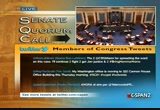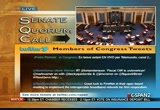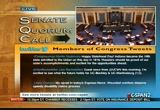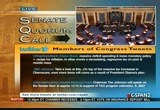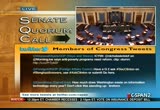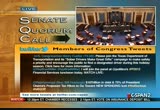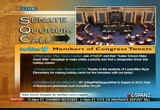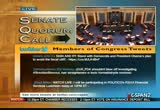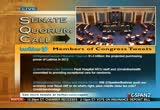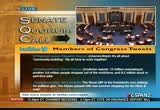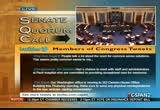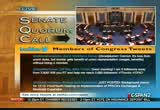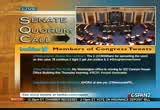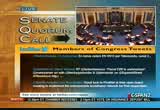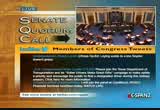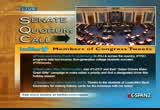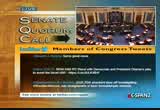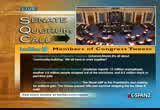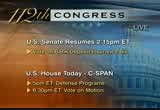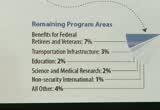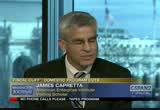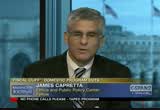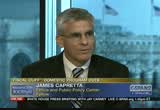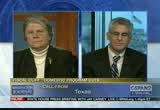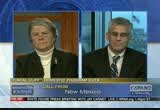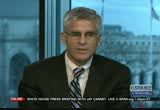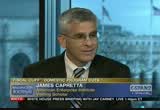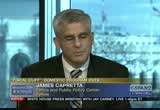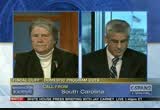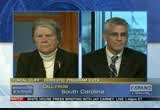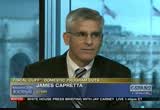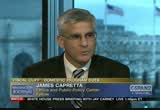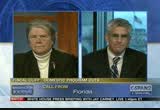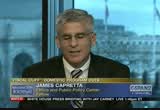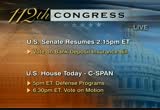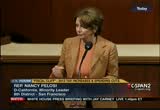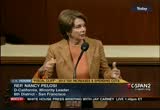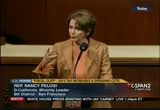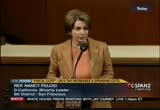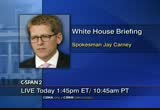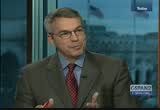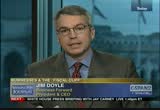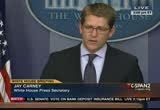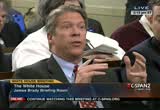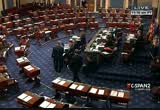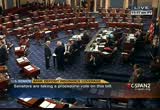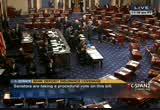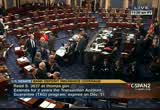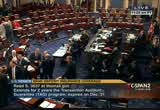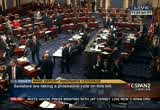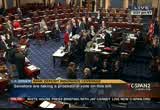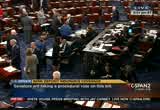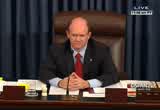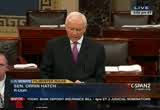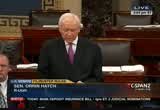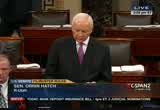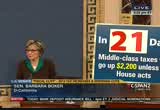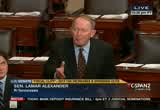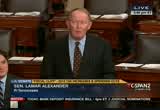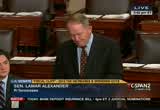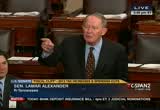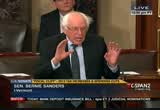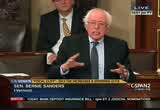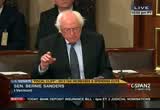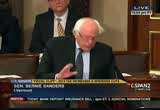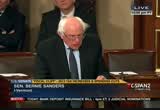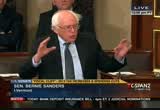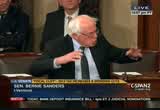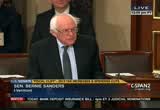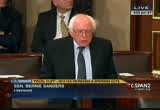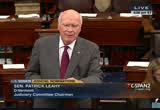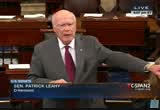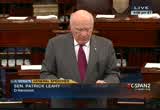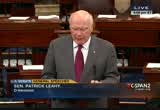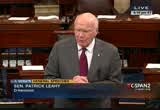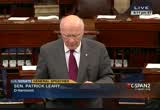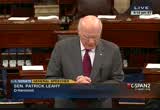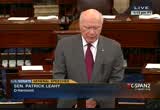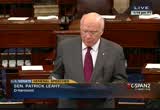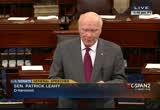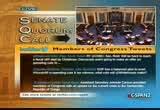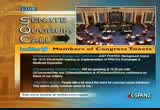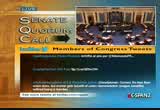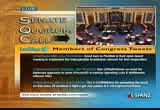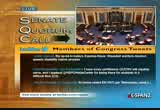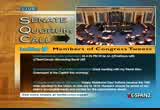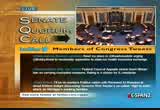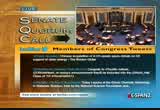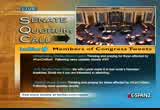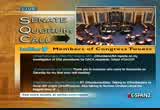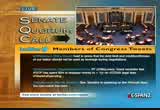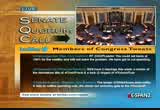tv U.S. Senate CSPAN December 11, 2012 12:00pm-5:00pm EST
12:14 pm
mr. akaka mr. johnson: mr. president? the presiding officer: the senator from south dakota. mr. johnson: i ask that the quorum call be vitiated. the presiding officer: without objection. mr. johnson: mr. president, i want to express my support for s. 3637, a temporary extension of the transaction account guarantee -- or t.a.g. -- program. the t.a.g. program, which is administered by the fdic for insured depository institution
12:15 pm
and the ncua for credit unions provides unlimited insurance for noninterest-bearing accounts at banks and credit unions. these transaction accounts are used by businesses, local governments, hospitals, and other nonprofit organizations for payroll and other recurrent expenses. and this program provides certainty to businesses in uncertain times. these accounts are also important to our nation's smallest financial institutions. in fact, 90% of community banks with assets under $10 billion have tag deposits. this program allows these institutions to serve the banking needs of the small businesses in their communities, keeping deposits local. in my state of south dakota, i
12:16 pm
know that the tag program is important to banks, credit unions, and small businesses. our nation's economy is certainly in a different place than it was in 2008 at the height of the financial crisis when this program was created. but with concerns about the fiscal cliff and continued instability in european markets, i believe a temporary extension is needed. therefore, i believe a clean two-year extension makes the most sense. it provides the most certainty for business and financial institutions. it also provides time to prepare for the end of the program in two years. i want to note that this legislation has a cost recovery provision that ensures that no taxpayer is on the hook for this
12:17 pm
insurance, financial institutions pay for the coverage. this is not and never will be a bailout. this is simply additional insurance paid for by the banks to ensure that these accounts remain stable. lastly, i want to thank lydia -- leader reid for making this issue a priority in the lame-duck session. i also want to thank senator shared brown for being -- share order brown for being a great partner on this important topic. the administration has just issued an s.a.p. in support of the tag and i ask unanimous consent to enter it into the record. the presiding officer: without objection. mr. joorns mr. johnson: i ask my colleagues to support the extension of tag. i yield the floor. the presiding officer: the clerk will call the roll. mr. johnson: i note the absence of a quorum. the presiding officer: the clerk
12:22 pm
senator from south dakota. mr. johnson: i ask consent to vitiate the quorum call. the presiding officer: without objection. mr. johnson: i ask consent the senate recess until 2:15 as provided for under the previous order. the presiding officer: without objection. under the previous order, the senate stands in recess until 2:15.
12:24 pm
>> guest: well back in the 1980s they used to talk about the vegematic which was a late night kitchen product mindlessly did cutting for you. in 2011 budget control act congress was supposed to have a super-committee that would determine about $1.2 trillion in deficit reduction over 10 years. the super-committee failed. so "the back-up plan" was something nobody wanted but it was supposed to put the fear of daylights into everybody and that was across-the-board cuts of
12:25 pm
about 500 billion over 10 years. >> host: in domestic spending? >> guest: yeah, domestic spending. another 500 billion in national security related spending. >> host: so for 2013, we're talking about a total of $109 billion in cuts. the non-defense part of that, discretionary spending makes up about eight eight billion. -- 38 billion. non-defense mandatory is 16 billion. can you explain the difference? >> guest: the mandatory has to do with entitlement programs that are beneficiaries or committed to receiving by law and discretionary spending is where congress has an annual appropriation and that has a lot more flexibility year to year which to cut and which to raise. >> host: so if this happens, let's just begin with what's not on the table. what is exempted from sequestration when it comes to domestic spending? >> guest: well, there's a list of civilian, military
12:26 pm
pay, veterans benefits, a lot of the what would be called social welfare programs, like the food stamps or snap program. women, infant children. there's retirement, social security, medicaid is exempt. there is also federal salaries in terms of their general schedule brackets can not be affected. >> host: so there is a lot of cuts that would go through if sequestration happens but what are some of the big ones people would notice? >> guest: well in october the ranking member of the house appropriations committee did an excellent letter to colleagues that had a lot of detailed projections. remember the agencies have been proi believe hadded from actually mapping them out in detail. so a lot of the projections come from congress and they come from the interest groups that monitor it but this house appropriations letter detailed about 24,000
12:27 pm
jobs in the homeland security department, which included 3400 border patrol and 7200 transportation security administration employees. it talked about 3,000 fbi employees. it talked about head start programs. 100,000 fewer children being enrolled. it talked about women's health programs for breast and cervical cancer. 45,000 low-income women would lose that. and women infant children nutrition program, about 900,000 participants would lose out. and teachers would be cut about 16,000, fewer teachers. which is, that is kind of a concrete cut that people would notice. >> host: here are some other ones from "bloomberg news". national institutes of health, 2.5 billion. the fbi, 742 million. customs and border patrol,
12:28 pm
712 million. the nutritions programs for women, infant and children, wic, 543 million. federal courts, 384 million. low income heating assistance will get knocked off by 285 million. 183 million cut from the national parks system. and 129 million in u.s. embassy security and construction. after the whole benghazi thing that could be cut. >> guest: exactly. they're trying to put some of that money back into embassy security i just read. well i heard from the national association of, national parks conservation association that the sequestration cut for them would be the equivalent of shutting down 200 parks with about 9,000 seasonal employees laid off. that would be something people with notice when they go visit. >> host: so both sides are trying to come up with some sort of a compromise so they avoid all the cuts we just talked about. what do republicans want to do? >> guest: they have more
12:29 pm
emphasis on spending cuts than president obama and john boehner has come up with about $2.2 trillion plan over 10 years. he offered 800,000, i'm sorry, 800 billion in revenues, which he would like to get from tax reform, broadening the base, removing some of the tax deductions. without raising the income tax rates on the higher income households. and that is the sticking point. president obama has offered not real specific plan for spending cuts. in fact he has offered to, he wants to do a little bit of economic stimulus for job creation. but he has offered about 400 billion in medicare cuts as a starting point. but president obama is, seems to be going to the mat on raising the top two tax brackets for households earning 250,000 or more.
12:30 pm
and this is what the republicans, political and for historical reasons have had the most trouble with. >> host: house republicans according to the "usa today", we're looking 300 billion in mandatory savings and 300 billion in discretionary savings. that is their proposal so far put out by the speaker. what are we talking about here? >> guest: the best indicator of that would be the budget passed by the house compiled by paul ryan, the chairman of the budget committee who recently ran for vice president and it includes budget category cuts like in transportation or in social services for income security. it doesn't get down to the specific programs level but he is talking, you know, 26% cut in transportation. which analysts have extrapolated, which could mean, you know, huge cuts in number of air traffic controllers, for example, which would cause flight
12:31 pm
delays and flight cancellations. so they would have it get more specific later on but that's, right now there are just fighting over the general framework. >> host: so how much does domestic spending consume of our federal budget? >> well, if they cut 38 billion, we have a 3.5 trillion dollar budget annually. and the goal of the sequestration or a more thoughtful approach reducing the deficit is about 1.2 trillion. so domestic spending is pretty small compared with that and compared with the defense budget and compared with social security and medicare and medicaid spending. >> host: yeah. center on budget and policy priorities puts the numbers at 20% for defense and international security assistance. 20% for social security. 21% for medicare, medicaid and chip programs. safety net programs, make up
12:32 pm
13%. interest on debt about 16%. that 13% number when we talk about domestic spending cuts? >> guest: yeah and it's, some of this is subject to horse trading in congress. the earmarks that used to be a lot more common but still sort of sneaked in there. and the house-senate conferences between the appropriations committees often have to do some log rolling to make things happen but that's where they have the most decision-making impact. >> host: let me go back to this pie chart because there's another component to the federal budget and the center on budget and policy priorities says the remaining program areas of that piece of the pie, 7% is benefits for federal retirees and veterans. 3%. that piece of the pie, transportation infrastructure. 2% makes up education. 2% for science and medical research and 1% for nonsecurity international. 4% all other. that is break down of the
12:33 pm
federal budget. >> we will hear from white house spokesman jay carney coming up in half an hour. the briefing at 1:00 eastern live here on c-span2. up until then more from this morning's "washington journal" focus on domestic program cuts. >> host: domestic spending cuts is on the table for the fiscal cliff talks. two different perspectives for you here. isabel sawhill, brookings institution. brookings center on children and families. james capretta ethics and public policy center and visiting scholar at aei. let me begin with you. are these potential domestic cuts under sequestration devastating or manageable? >> guest: somewhere in between. not a good idea. they would be very deep cuts, you know, an 8% cut across the board is a very significant one-time cut for any program to sustain in immediate year period. so they're not a good idea.
12:34 pm
would it be the end of the world, no? >> host: what do you mean by that? >> guest: well, i mean there would be downsizing of a lot of services across the government in terms of the domestic accounts. so it would be fewer services being provided. there would be reduced federal employees. some grant programs would take a haircut of five, 10%. so there would be downsizing of the services provided by the federal government. but the economy would go on and the government would go on and the public would still continue to get by and large served. >> host: can agencies manage this? have they in the past? >> guest: we have managed sequesters in the past, not of this size. this would be a pretty big, this would be the biggest one to my knowledge we've had one-time cut across the board like this. so, don't get me wrong, i'm against, for disallowing the sequester to occur. should have targeted cuts in programs rational and talked through. >> host: there should be spending cuts? >> guest: absolutely. >> host: should be
12:35 pm
thought-out ones. >> guest: absolutely. >> host:. if domestic cuts happen, do you think it is devastating? >> guest: i pretty much agree with what jim just said. that is 8% cut. that is pretty deep. that is serious stuff and it is done in a bad way across the board as he said and not picking better programs versus the worst ones and choosing wisely. the other thing i would add is it is on top of some cuts we've already enacted. i think a lot of people don't understand that as part of the budget control act, a law that was passed in 2011 as part of the debt ceiling crisis of that year, we already cut spending across the board, discretionary spending across the board by 7% or so. so when you layer these new cuts on top of the ones that have already been enacted, the total cut is more like 15%. that gets to be quite
12:36 pm
devastating. >> host: jim capretta said these are manageable. economy goes on. agencies figure it out. do you agree? >> guest: well, look, is it half empty or half full? it is not like 9/11. it is not even like hurricane sandy. it is not like iran getting nuclear weapons but it's very serious stuff and the worst thing about it is that it's so indiscriminate. it is so poorly done. it was never intended to be a way to cut spending. it was intended to be an enforcement mechanism, a disciplinary measure on the congress and the white house to make sure they got something done before 2013 began. and everybody thought, well, with this doomsday scenario in front of them they will surely enact a budget deal, and i think they probably still will but that was its purpose. its purpose was not just to cut government spending. >> host: let's take a look
12:37 pm
at some of the examples of programs that would get cut. national institute of health, 2.5 billion. the fbi, 742. customs and border patrol. the wic program. 543 million. federal courts, et cetera. the list goes on. national parks. what do you make of those numbers and size of those cuts? >> guest: those are pretty big numbers. i think, absolute numbers don't mean a lot to people. i mean, you know, when we talk about millions and billions jim and i both served in government and we know what happens when you have to deal with numbers of that size. so i think telling people it is about an 8% cut, or 15%, if you talk about what is already occurred, gives it a better sense. it will be on everything. so whatever program it is, it will be reduced. so whether it's money for the nih as you said, which does research on cancer and alzheimer's and diabetes and other chronic diseases, they are going to be doing less
12:38 pm
research. if it's, you know, the fbi or the border control people, there will be less law enforcement. there is going to be less money for housing assistance and for child care and for slots in head start. it will be fewer teachers. >> host: right. >> guest: a whole lot of things are going to happen, or would happen. >> host: should there be any cuts, any further cuts? >> guest: absolutely. what we need balance of spending cuts and revenue increases? i agree with the administration's focus, increase on the revenue side. but going forward, the big items in the budget, the ones that are causing the problem are not these little programs that are threatened right now. they're the big programs like medicare and
12:39 pm
social security. >> host: but sticking to domestic spending. should there be anymore cuts to domestic spending? >> guest: i would never say there should never be anymore cuts. if there are going to be more cuts they should be very carefully chosen. and i think this particular part of the budget, just only about 18% of the total, has already taken a very big hit. and it's a part of the budget where we invest in research, where we invest in education. where we invest in infrastructure. so i don't think that is the best place to cut. >> guest: and i --. >> host: i will get to jim in a second. let's stay with the domestic spending cuts. education, what would be the impact of sequestration on education do you think? >> guest: well most education spending of course is paid for by state and local governments but the part that's paid for by the federal government would be very hard. so there would be the need, because of less grants in aid from the federal
12:40 pm
government to the states, there would be less money for teachers in especially schools serving less advantaged students. there would be less money for special education, for kids with handicaps or disabilities. there would be, you know, less money for a variety of things of that sort. >> host: jim, i know you think the cuts are too deep but where can you cut when it comes to education? >> guest: i'm not sure i would use the word too deep. i think they're indiscriminate. >> host: indiscriminate. >> guest: we need to restrain spending. there is a lot of room to cut this portion of the budget. there is true, what i would call a relatively modest cut already, that was off very high base. there has been a very large run-up in the portion of this budget last 12 years. between 2000 and 2002, the real increase in the spending in domestic appropriations has gone up 40%. so there has been a steady, steady rise. that including education, health care, infrastructure,
12:41 pm
across the board. these programs have all been elevated in their size. so there is room to retrench a little bit without doing a lot of damage. so for instance, in the education space the programs as she indicated are federal programs in addition to what state and local governments do. there is no evidence that much of the spending has had any positive impact on educational achievement at the state and local level. so we've been doing this now for 30, 40 years. lots of studies have shown that the federal money has been, largely irrelevant in terms of educational achievement. it is also a very small portion of the total education budget. it has been increased substantially at the federal level. confusing political accountability. education is incredibly an important issue but has to be handled at the state and local level. if the federal government pulls back somewhat on its funding it could actually aid the, the school systems of state and local level, if
12:42 pm
there is much more political accountability where they have to decide how much they're going to invest in their schools. >> host: let me move on to public safety, jim capretta, how much could be cut there? >> guest: well, public safety is obviously a very important role at the federal level. we have things like the border patrol and fbi and administration of justice at the department of justice. most crime fighting is done at the state and local level, not at the federal level. however, i don't think there's that much room for cutting in that portion of the budget. i think there is like anything else, there are some room for consolidation, for some overhead removal. if i were to cut in this area of budget i would be focusing on things like reducing the size of the workforce. i would be looking at consolidating programs duplicative. gao done a number of studies across a number of areas including administration of justice. i would look at low-performing programs. there have been a number of evaluations of programs that say, are they actually achieving the results they're intended to do
12:43 pm
achieve? and many studies have been done showing they, some programs actually don't do anything in terms of delivering public services. so i think those are the areas i would focus the attention on. and there are some deep cuts that could be achieved there. >> host: senator coburn had a report that he sponsored. it was written up in the papers last week about homeland security grants, that really ballooned since the 9/11 attacks. and you're looking at cities that have made up implausible scenarios for terrorist attacks. room to cut? >> guest: i think so, yeah. i'm not an expert in the homeland security area but i'm familiar with the general point and i agree when the federal government starts giving out grants like this, there's lots of room for abuse and made-up roles and made-up responsibilities to try to get federal money. i think that has taken place to some extent in that area and i would take a hard look cutting back. >> host: isabel sawhill, what are you hearing here?
12:44 pm
>> guest: no one can disagree with the idea we ought to make sure that the government has well-performing programs. i would give the current administration pretty high marks on worrying about that. they have a whole program in place to evaluate programs and where the evidence suggests they're not working, they are trying to cut back or else reform the programs. let me give you an example, the head start program, very popular program, that put use, used as federal money to serve three and 4-year-old kids from poor families and help them get ready for school. and early childhood education of that sort has long been a fairly effective way to help kids succeed. however, the current head start program is not always operating up to snuff. in fact there is some evaluations that show that there are enough head start centers not doing well, that they really need to be closed down or the money
12:45 pm
needs to be recompeted. well the administration is doing that now. so i think what jim and i are both saying it is indiscriminate nature of these cuts that's wrong, and i might disagree with him a little bit on this notion that we're spending too much money on this part of the federal government. if you look at the proportion that we're of money that we're devoting to these programs as a proportion of gdp, of size of our economy, taking into account population growth and everything else that's happened over the last 40 years, then they're headed towards their lowest level on record, and i think this is not the way you grow a strong nation is by cutting education and research and infrastructure and these kinds of programs. >> host: so we're talking about domestic spending cuts. what would be on the table if sequestration happens? also the two sides are coming, trying to come to some sort of a deal to avoid those automatic spending
12:46 pm
cuts but any deal would contain cuts to domestic spending as well. that means as we talked about here, education, public safety, public welfare is on the table. possibly health care. federal government research, parks et cetera. george, springfield, illinois, independent caller, what do you want to say, george? go ahead. >> caller: good morning. i have a two-part question. number one, would you explain to an i will lit a the -- illiterate individual like myself what baseline budgeting is, define it and then, the second part of it is, how can a one, two, three, four, whatever percent increase in spending money available to a department be considered a cut? thank you. >> host: okay. jim carpet at that. >> guest: baseline budgeting means that the office of management and budget, calculate the budget projections they do what
12:47 pm
budget will look like next year and assume current law for programs automatically grown, things like social security and medicare. they assume for the domestic accountses what we talk about this morning, assume will grow in inflation. assume automatic increase of roughly two to 3%, inflation rate will occur to keep the programs in line with inflation. then they measure a cut against that inflated baseline. so they will say, if you cut below that level, then you're making a real cut in the program. so, for instance, if a program was going to grow under the baseline by 3%, and instead it grows by only 2%, in washington parlance that is considered a cut. i know for a lost americans they say, wait a second, still grew by 2% but that is in the way washington views things. that is viewed as a cut. >> host: grace on twitter exactly. cuts have already been made. there should be no more cuts to domestic spending. only military cuts. how do you respond to that as well?
12:48 pm
>> guest: i think that is actually not true. if you look in the history between 1989 and 2008, the dough mebs tick accounts as percentage of our total gdp was about 3.6% on average over that two decade period. we had a very major run-up, partly due to the stimulus but due to large increases in spending that occurred in 2009 and 2010. president obama came into offers, he increased this portion of the budget very substantially, 24% over a two-year period. so there has been a very major run-up in these programs. you can do some retrenchment back to the 2008 levels without doing any damage whatsoever? >> host: isabel, sawhill. >> guest: on this last point, the run-up that jim just alluded to was due to the recovery act. in other words, because we were in a recession and we enacted a stimulus plan. some of these programs were bumped up but that is temporary. and most of that will go away, partly because the recovery act is going to expire and partly because,
12:49 pm
as i said earlier, we've already had some cuts which take the form of putting hard caps on how much congress can appropriate for this part of the budget. and those hard caps are going to bite over the next decade. those are things that already been enacted. so i agree with the caller who said we have done a lot of cutting in this part of the budget already. that doesn't mean we don't need spending cuts elsewhere, i think is the wrong place to do them. >> host: isabel sawhill right-wing on twitter says, the democrats won't cut the part that needs cutting. >> guest: well, there is some truth to that because as i said before, the drivers of our deficits into the future are social security, medicare, medicaid. these are, 40% of the budget or more right now. and growing very, have he rapidly. partly because the elderly population is growing, and
12:50 pm
partly because health care costs per person are going up very rapidly. so if the public wants less medicare, less social security, less medicaid, which pays for nursing home care, as well as for health care for low income families, fine. but, and we're going to need to go there but we can not continue to squeeze money out of this small part of the budget that's called domestic discretionary programs. >> host: what we're talking about, safety net programs which make up about 13% over of overall budget and the other portion of that pie is 7% of that portion is benefits for federal retirees and veterans. 3% for transportation infrastructure. 2% for education. 2% for science and medical research and 1% for nonsecurity international spending. i assume that means foreign aid, 4% for other programs. raymond in michigan, democratic caller.
12:51 pm
go ahead. >> caller: yes. i have a two-part question. i was wondering, for one, i'm going to be retiring here in another 12 years but i'm not going to have social security until probably the age of 70. i'm 50 now. and i was wondering, right now if i was to lose my job for some unforeseen reason, i will lose my benefits. i have the option, as an employee to keep my benefits at a about $800 cost. but when senators and congressman step out of their position, i'm not mistaken, they still have their insurance for life. and then the second part of the question, that i am posing is, i believe they are going to get a 3% pay raise every year and i have never seen in my lifetime them stop that. i was wondering if that is something could be possibly done? >> host: isabel sawhill. >> guest: i assume what
12:52 pm
you're talking about is that if you were to lose your job you would lose your benefits, you mean primarily your health care benefits. and you're right. you would lose them. under the affordable care act once it is implemented in 2014, that would enable you to go on an exchange and buy a group plan and if your income was low, you would also get a subsidy from the government to buy that, up to, fairly, up to a moderate income level. on the point about pay raises, you may be interested to know that there's actually been a bill introduced in the congress that says, no budget, no pay. in other words it says if congress can't get its act together and fix this budget problem, they shouldn't get paid. now not surprisingly that bill has not been enacted but it is interesting at least there has been a group in the congress that has been willing to put that legislation forward in response to your and many
12:53 pm
others comment. >> host: jim capretta, here's a tweet for you. cutting the size of the workforce means people get laid off. is it a good idea to lay off during high unemployment? why not wait? >> guest: well, we need to restrain spending at the federal level and there's, actually it was an interesting study very recently that showed if you just look at the productivity of the federal workforce, look, i've been a federal worker most of my career. i admire the federal workforce. there are many things being done well but we need to get even more out of our federal workforce just like we need to get even more out of the private sector. as part of making the federal government more efficient of course there will have to be looking at downsizing the size of the federal workforce. that doesn't mean it is necessarily bad. it could mean the federal deficit is reduced that frees up more room for the private economy to be optimized. you can't look at this entirely, federal government needs to prop up employment at federal level and state and local level. i don't think that is the good way to look at economy
12:54 pm
and economic growth. >> host: brenda, fort worth, texas, independent caller. hi, brenda. >> caller: hello. i had a couple statements but regarding the congress expenditures on themselves and their money, "money" magazine in the 1990s did an article about that where they had, at that time, went from less than a billion to operating on 2 or 3 billion. they found four people that worked for one congressman, all they did was work to get him reelected and other uses of our taxpayer dollars which it wasn't wasn't meant for. along with that which i was calling about, social security employee, federal employees get bonuses. this is been going on for 40 years, i know. and i don't understand if they're getting a salary, an hourly salary and so forth, why should they get bonuses?
12:55 pm
>> host: isabel sawhill? >> guest: i think bonuses are not such a bad idea. the private sector uses bonuses to give an incentive to people to perform better. you don't necessarily get a bonus automatically. you get a bonus if you have done something to imprevious service or been a very highly productive employee. and i think by the way, it is worth pointing out that the social security administration systems, would be affected by this sequester, not the benefits. not the check that goes out to retired citizens. but the administrative expenses in the social security system, which by the way are quite low considering the big job they have. but there would be slower processing of initial applications. there would be slower processing of claims for disability insurance. i think we would not be
12:56 pm
well-advised not to give incentives to federal workers doing those kinds of jobs to be the best they can be. >> host: farmington, new mexico, republican caller. >> caller: this is smitty from farmington, new mexico. what a wonderful time. miss sawhill your information is sew outdated it is incredible. if you want to know how much we waste, a guy up in the northwest, won a lottery, took home $800,000 cash and went down to his local food stamp office, told him that he won the money. they said he still qualified for food stamps. these people are nuts. the federal government probably has a minimum, very minimum, i've worked for government and i worked in the utility inindustry which is almost the same as working for government, at least 40% overpaid, at least, too many people working. at least 40% more people than they need to do the job. it actually incredible.
12:57 pm
when people say they're cutting budget. they're not cutting darn thing. they're cutting growth in government. congress doesn't vote themselves raises anymore. they get automatic raise unless somebody has the gonads saying wait a minute we don't need to have a raise this year. think haven't done it since they actually put that into effects. they don't vote on raises anymore. >> host: let's get a response. isabel, sawhill. >> guest: i'm sorry i don't agree with all your facts there. certainly one can find instances of fraud and waste in the federal government as one can in any kind of organization. and so, i'm going to, once again say we need to do a better job. there is a lot of money being allocated now to what is called program integrity, meaning let's make sure that the money is spent for what it was intended for and not misused in any way. let's crack down on fraud where it exists because
12:58 pm
there will be citizens that try to game the system. and sometimes they will succeed. but that down mean that i think that the entire system is therefore bad and should be slashed and cutaway, way back. >> host: line for democrats. doug, nicholsville, virginia. >> caller: how are you doing this morning? >> host: good morning. >> caller: appreciate you taking my call. i'm, i don't see why the highway departments can't add a few more cents tax to the price of fuel and make jobs with that. i mean just run the whole department on what they can collect. >> host: jim capretta? >> guest: there have been proposals over the years to raise the gas tax which i think is what the caller is talking about. to pay for the highway program and, that it is not a very popular provision. one of the most sensitive
12:59 pm
items in the economy is the price of gas and so there's a lot of voters who watch that, at the pump every day or every week when they go to the pumps. it is not a very popular item for a politician to propose raising the gas tax to fund more highway spending. i would say we need to move toward a system where we get toward energy independence. there are lots of efforts underway, including about this administration and ideas we're talking about in the campaign to do that. i'm generally supportive trying to move on all fronts in that area. i think that is generally where we need to go. >> host: speaking of the administration, i want to show our viewers what the administration and what republicans are proposing to avoid sequestration, these automatic spending cuts on the domestic side. the white house says a one-year deferral of sequestration and multiyear stimulus package. i think figures out at 50 billion. jim capretta, is that a good idea? >> guest: well i'm for defering the sequester so we
1:00 pm
1:01 pm
and 2012. i am for continuing that could i think it would put money directly in the pockets of working families. i think that actually could help the economy. i'm very enthusiastic however that more spending through the measures enacted in 2009 would do much good. i don't think they did much good last time around. >> host: >> guest: i think a one-year deferral would be okay if the package looks good. i think the stimulus of $50 billion is a great idea, and the reason is because we still have the unemployment rate at 7.7%. which is very high by historical standards. the recovery is very fragile. they start raising revenue and
1:02 pm
cutting spending right now in a major way and do it in 2013 as opposed to doing it, but doing it more gradually and giving the economy a chance to recover that's not going to be good, and i really think we have to remember it isn't just our debt and deficit we have to worry about, it's the economy and if you want to create jobs, then we don't want to ratchet down with the government is doing in the short run. you want to do it in the longer run. you want to tackle those entitlement issues that jim is talking about but that doesn't mean you want to do something big in 2013. host koza avoid the sequestration the house republican, the speaker has put forth a plan to his proposal includes 300 billion mandatory savings, 300 billion in discretionary savings. do you agree, disagree? >> guest: i think that the big issue is the overall balance of
1:03 pm
the package, not of a specific number for any one piece of it. so i think that if republicans agree to something similar to what the president has asked for on the revenue front which is 1.6 trillion in the new revenue over the next decade, then democrats will be willing to go along with spending cuts and the president is already put three injured $50 billion at lease on the spending cuts on the table to talk about. so i think it has to be a package. >> host: jim capretta what do you think of the proposal? >> guest: they should be more aggressive frankly on the entitlement reform side. i think probably because the election they are not asking for as much. i think they should. the operations of medicare and medicaid, how they fit into the larger health system is a much
1:04 pm
bigger issue. but the programs have the problems associated with an excess of cost growth related to the waste that occurs in the medical corps generally command programs need an injection of what i would call competition in the program. a consumer based system where the consumers have to select based on the activity. that is the key ingredient to getting some control over these entitlement programs. it's been proposed and discussed a lot on the campaign. it's called premium support. i fink in general that's where we need to go as part of a reform plan and the president doesn't like that approach of course how you go about reforming the entitlement is just as important as reforming them. unfortunately, so this is a big issue and i think it is going to have to be a big part of the budget negotiation >> host: california, independent caller. hi, daniel. you are all in the air. going once, going twice.
1:05 pm
okay, don. pennsylvania, republican caller. hello, regina. >> caller: i want to say since you brought up the social security think, it means these people aren't going to take money out of the bank and expected to be promising. i think this is a very bad program to take that money out of paychecks and social security is already bleeding. put it where it belongs. for the nations which i find that other levy said with this institute you can just go get your health care, to that man that called you can go get your health care from the subsidies. with a second. the article in the tribune reviewed can kanaby cato institute policy.
1:06 pm
>> host: we have had him on many times, regina. >> caller: he is saying it would cause california department of insurance estimates even with the subsidies roughly 25%. it's making people go away from these states where they can't afford these. how about if we go to the united nations and get them out of our budget? >> guest: well, i think your first point was about social security and that we shouldn't touch it is my understanding according to the payroll tax. i think what she's talking about is there is an earmark tax called the payroll tax that fund social security and she thinks that the government is stealing some of that money or using some of that money inappropriately and people that make that argument, if that is your argument, you're in good company. i don't happen to agree with that perspective because this is
1:07 pm
just like i say if a household had two different accounts one was only spent on its retirement needs and another is spent on everything else the money is fungible and so it all comes out in the wash but that is a more complicated discussion. and what's happening to health care premiums i just simply don't know what your evidence is that the affordable care act is going to cause an increase in premiums. jim knows more about this than i do, but there are portions in the law that limit how much of the money can go for anything other than actual care. if we think that more people are going to seek care once the affordable care that goes into effect, i suppose that could drive up the cost. but there is nothing until law itself that says that is bring to happen.
1:08 pm
>> guest: it is an almost a dead certainty it is going to go up quite substantially, and the reason is that the law imposed a leading man system of premiums can be charged by insurance companies so many people in the individual and small group market today getting insurance on their own or through a small business they tend to be under and relatively healthy. and the result when the rules come into play, those people that have insurance today are going to see very substantial as michael indicated in the column, very substantial premium increases on the order of 25, 30%, 40%. you can ask any execs that is going to happen and they will tell you it's true. >> host: marion, south carolina, independent caller. >> caller: of eink -- i don't know why republicans want to pick up the so-called entitlement programs. i don't think that is the
1:09 pm
problem. and i know that you mentioned something about the stimulus. welcome the president bail out the banks the problem is they've got the money and start giving it back. i think we wouldn't have anything. i think we should support the government to have the government-run think that way everybody can live the right way people satisfied and everybody wants to work but you still have a decent job. you know, we have to realize most screwed the country of so bad that we are making it now so it's not the entitlement program commits the ones like the on
1:10 pm
necessary war for all that money was spent on and the independent contractors that were connected through. >> host: jim capretta? >> guest: i disagree with the point of view on the entitlement program. 1972 the government spent roughly 4.4% of gdp on the major entitlement program, social security, medicare and medicaid. that is reason since that time the number was about 10% of gdp. and in another two decades by 2030 is going to be about 15% of gdp. so, that is a very substantial, that is a tripling of the size of the spending of the percentage of our economy over a 50 year period head the entire budget is being consumed by the entitlement program. there is no way around it. that is the issue. is already putting pressure on the fiscal policy today. it's going to put much more pressure on the fiscal policy in the decades from now. it's imperative for the country, the economy, the federal budget that we address slowing the pace
1:11 pm
down. that is absolutely critical. that's what they should be talking about. >> host: texas, republican caller. >> caller: yes i keep hearing that we are going off the fiscal cliff. as a 65-year-old texan, i don't understand why they want to cut programs from last when they're sending money to countries that don't do nothing for us. if i can live on 800 something dollars a month, getting $9 increasing in january. but these people in washington are getting hundreds and hundreds of dollars. why not take a cut in pay? why not put giving these countries all that money then we can budget what we are going to spend.
1:12 pm
>> host: that's the type of call that we get a lot. cut their salaries. >> guest: yes, we do hear this question a lot. and i think what you need to understand is that the amount of money that we spend on foreign aid is tiny. we could eliminate it entirely and would only make the slightest in this problem. just a tiny dent, not really enough. similarly, we could totally eliminate any reasons for federal workers and even cut their pay and again the effect would be tiny. so this is fun to talk about but it doesn't solve the problem because it is just a drop in the ocean. massachusetts, democratic caller. >> caller: hi.
1:13 pm
the woman that was just talking i disagree with her on a drop in the bucket when you look at curbing the government pay. when you guys talk about the areas that get cut, the military spending, discretionary spending and entitlement, what i want to hear in addition to that is government waste and fraud. when you talk about entitlement to your a lot of people talk about public waste and fraud. but in the government waste and fraud i think isabel refer to it as instances, and where the gsa was an instance of a great deal of money that was being in appropriately spent. senator coburn has come out and talked about redundancy and programs. senators and congressmen not looking back to see if there is a matrix in place at to see if theoretically working sutphen on performing programs.
1:14 pm
>> host: let's get a response because we're running out of time here. >> guest: well, once again i cannot emphasize enough that i am very much in favor of eliminating fraud and waste and inefficiency. it's hard to do, and i don't agree with you that we are not doing it already come and i don't agree with you that it would save a huge amount of money. in terms of getting rid of less effective programs or reforming them, once again, i am in favor of doing that as well. we do need to keep working on that. there are some of programmatic spending that should be eliminated or curtailed. when i was in the clinton administration in charge of the social programs of the federal government, i had a wonderful staff, highly trained, highly competent, i wouldn't have wanted to play than a lot less.
1:15 pm
they were doing the work that you seem to want to have done which is to scrutinize all of these programs and put pressure on the agencies to cut those that are not working and to fill out all of the inefficiencies in the fraud, and i think jim has had some similar experiences. >> guest: very much like the federal government does try to root out waste and fraud, but when it's the taxpayer money involved is different from the private enterprise. the ability for fraud to creep into the government programs financed by tax is slightly higher than it is in the enterprise. people are watching because shareholders have their own personal money at risk. so i think it is endemic in the government with a certain amount of problems in this area. for instance in medicare there is probably on the order of $60 billion per year in wasteful and fraudulent payments. it's a huge number, and that is in part because the medicare program is paying a million
1:16 pm
claims a year for medical services to track those billion claims a year and figured out which ones are right and which ones are wrong at the federal level but there's a certain amount of things that go on and the government that are very different to get of a restyled. the caller is right that should be a top priority. >> host: kathy four of republican caller, you have to make it quick. go ahead. >> caller: hi. >> host: hi, cathy. please go ahead with your question or comment. >> caller: first i think it would be great -- can you hear me? >> host: yes, we can. how >> caller: it would be a great service to the elderly people of they would stop calling social security an entitlement program. the employers and our wages, which actually funded that. secondly, is the administration actually aware of the ways of the people either suffering as a
1:17 pm
way of going back and forth when we have more ways of doing things for herself? >> host: what specifically are you talking about? >> caller: i'm sorry what did you say? was to what specifically are you talking about? >> caller: specifically i guess i should address the $58 million or $58 billion that we pay a year for foreign aid. that $58 billion that we have each year is to secure or why our protection so that our citizens are there and people who keep favor with them. >> host: if i could refer to you, jim, this is a job in the bucket when you're talking about foreign aid. >> guest: there's a misconception in the public about the size of the foreign budget. it's not billions and billions of dollars but in the size of the 3 trillion-dollar budget is
1:18 pm
very, very small. i am not an expert in this area but i am of the view that the amount of money that is being spent is trying to position the united states to have influence in the world, bring about the values that we have in this country to spread those. i can't -- i'm not really a big fan of saying that it means to go. >> host: unfortunately we have to leave it there. i'm sorry. jim, thank you very much for both being part of this. >> we are going to take you live to today's white house briefing scheduled to start at 1:45. the word is president obama
1:19 pm
1:20 pm
well, he's right. has a speg washington has a spending be hone let's be honest, west are broke. president's call for a balanced approach. a lot of people know that the president and i met on sunday. it was a nice meeting. it was cordial. we're still waiting for the white house to see what spending cuts the president is willing to make as part of the balanced approach that he promised the american people. where are the president's spending cuts? the longer the white house slow walks this process the closer our economy gets fought fiscal cliff. -- gets to the fiscal cliff. here's what we know. we know that the president wants more stimulus spending and an increase in the debt limit without any cuts or reforms. that's not fixing our problem. frankly, it's making it worse. on top of that, the president
1:21 pm
wants to raise taxes on many small business owners. now, even if we did exactly what the president wants, we would see red ink as far as the eye can see. that's not fixing our problem either. it's making it worse and it's hurting our economy. i think the members know i'm an optimist. i'm hopeful we can reach an agreement. this is a serious issue and there's a lot at stake. the american people sent us here to work together toward the best possible solution and that means cutting spending. if the president doesn't agree with our approach, he's got an obligation to put forward a plan that can pass both chambers of the congress because right now the american people have to be scratching their heads and wondering whe minority leader, ms. pelosi, for five minutes. ms. pells: thank you very much, mr. speaker. i -- ms. pelosi: thank you very much, mr. speaker.
1:22 pm
i'm glad that our speaker has brought the fiscal challenges to this floor. it's been long overdue. we have been calling on the speaker to bring forth middle-income tax cut now for a very long time. in fact, since last summer when it passed the united states senate. the president stands ready and poised with his pen to sign it. democrats in the house have a discharge petition to bring that bill to the floor. what stands in the way is an act on the part of the republican majority to bring a middle-income tax cut to the floor of the house. which across the country has almost universal support and which i think in this body, given the right to vote for it would have overwhelming support. up until know, everybody in the country, in pact in the world, have been talking about what's going to happen, those who pay attention to such matters, what's going to happen to the -- in the budget debate in the congress and with the president
1:23 pm
. at last that subject comes to the floor. what i would respond to what the speaker has said, though, is to set the record straight. the fact is that the president has and democrats agree with him agreed to over $1.6 trillion in cuts. in the budget control act and other acts of congress in this particular congress. $1.6 trillion in cuts. where are the cuts? they're in bills that you, mr. speaker, have voted for. secondly, on the issue of the entitlements, with the affordable care act and with legislation and the president's suggestions, provisions in the president's budget, it amounts to over $1 trillion in savings in medicare. over $1 trillion in savings which have been redirected to prolonging the life of medicare, making it stronger
1:24 pm
for nearly a decade while increasing benefits for our seniors and those who depend on medicare. not reducing but increasing them. there's been a massive misrepresentation about what that is, so i want to set the record straight. so in terms of spending cuts, we're on the record having voted for over -- about $1.6 trillion. in terms of entitlement reform, over $1 trillion already and more savings to be gained in further discussions on the subject. strong down payment. what is missing are two elements that the president put forth in his budget -- growth, investments in infrastructure. yes, the president has called for investments in infrastructure, to build the infrastructure of america and to create jobs, to grow our economy. and where are the revenues? where are the revenues?
1:25 pm
regardless of the cuts, the jacinta entitlements for has demanded in terms of what seniors that have to pay into medicare and what age that what happened republicans refuse to touch one hair on the head of the wealthiest people in our country. it supports the president'snt's initiative for extending the ext middle-income tax cuts whereby . 100% for they get a tax cut above 250 the people making more than to under $50,000 a year would be asked to pay a little more to contribute to the fiscal soundness of the country, to par the bill, the defense of the country, the support of the troops, the pillars of security
1:26 pm
for our seniors from the education of our children, the safety of our neighborhoods this is just asking the pay a little bit more while they continue toe get the same tax cut that everyone does. so is 100% of the american people get a tax cut, the upper ttiare asked to pay a little bit more so why think the speaker for finally uttering the words on the floor of the house about the decisions are that need to be made. again we committed to the cuts, we have acted upon the titlem entitlement and the president has more on his budget for all of this would be a down payment as we go forward and to the nexn sessionex of congress to talk about tax simplification and fairness with the loopholes ande having a tax code that is
1:27 pm
encouraging growth in our economy. but that is a longer discussion as we address the issue of how strengthen entitlements not ent by diminishing the benleefits, y by getting more for what we areg spending. so if it is social security, any changes in the social security should be left. if it is medicare any changes should be there to strengthen medicare, not to underwrite andd subsidize the tax cu ts for the wealthiest people in our country. i welcome so again, i welcome the speakers statements that he wants to solve the problems and the president has put forth his fth budget which has his initiativeh in it. he has said that he is willing to make some changes, but it'sit really important that any changes not hurt the middle. class that comes on to this and again we've said it's not about
1:28 pm
the price of the high and tax hikes, it's about the money that it generates. you can find the money is another way at the high end and let's see what the discussion is but it's not to burden theincomn middle-income in order to have bigger tax cuts of the high-end. they haven't created the jobs that is u simnfair and it doesnt always work we are getting closer to the holidays at the end of the year and i don't think there is any reason for us not to come to the table to make an agreement to give confidence to the consumers to the market'r at their end of the year so , cisions so that we will have their growth, the growth for the jobs thath, produce revenue, the
1:29 pm
obs to reduce the deficits and when it fixes the deficit, growt the economy, and do so in a way that makes it irresponsible cuts, strong investments for thr seniors and the pillars and the economic security for them and r their families. but it's not a time to inject even more uncertainty into the n lives of the american people ann the economy in the country and s snat that means globally. it is i'tn tthe time.eas are ba many of these ideas are bad at a time, but they are particularly harmful at this time. he ihis time i think the speaker for bringing the issue to the floor of the house of their i look representatives and we move forward quickly because time is the essence and every day that we can remove the full faith and credit of the united invtments ierica our investment of the future, or creation of jobs,ou and our perspectives
1:30 pm
the t and economic health of our seniors every day we can dos that. more quickly. with that, mr. speaker, i yield back the balance of my time. >> the senate gaveling in in about 45 minutes at 2:15 for a cloture procedural vote on whether to move forward with the fdic tag program bill that provides of limited deposit insurance coverage for non-interest-bearing checking accounts. again the senate at 2:15. outside washington in lansing michigan at the state house the michigan house approved the first of the two right to work bills that would weaken the union power in the state. the republican dominated chamber passed a measure dealing with public sector workers 58-51. coming up in about 15 minutes here on c-span2, we will take you to the white house for today's briefing with jay carney, and indications that
1:31 pm
president obama will be at today's briefing. we will have it live when it starts to read back to the conversation on the fiscal cliff this morning from the washington journal and a look at how the business is might be affected. of let's begin with what iss bi comeess and how does it t: about?t's >> guest: is an organization with a simple mission. our job is trying to make it ist easier for business leaders inon about country that care about policy issues but don't have a washington office or don't havea town spe to speak out on the issuesak of the public policy. >> host: so, is this a brand-new organization? >> guest: even a route for years three and a half supported by some of the biggest companies in c the world, but o- business leaders are around the country. we go out to small business owners and entrepreneurs and venture capitalists and try to o get them g more involved in the policy-making process. we so what we do isbring administrn
1:32 pm
officials, members of congress, governors out to cities around the country to do briefings with business leaders. we also bring those business leaders to washington and the president's economic team and tell them how to grow jobs and help the economy. host: what did the business leaders say to the president and how did that come about? guest: we have been doing this a year now when we brought in 50 different groups to the white house to talk to the president's economic advisers. related to the fiscal cliff, the last eight or nine meetings. and business leaders representing 32 states we have brought to the white house. the message they're getting is pretty consistent with simpson- bowles and with fixing the debt and with how the business relationship is characterized in the media. they're anxious for debt deal, because they want certainty as quickly as possible. they tend to use simpson-bowles
1:33 pm
as their frame of reference. the question is not whether it's the democratic or republican plan is better, is which plan is closer to simpson-bowles. host: here is the hill newspaper -- guest: well, [indiscernible] what we do is bring business leaders from around the country to brief the president and his economic team, on health care reform to immigration reform, the fiscal cliff, intellectual property protection. and the business leaders are speaking for themselves. generally speaking, business leaders are centrists, data driven, results oriented. they are looking for compromise
1:34 pm
in washington. is it a pro-obama group or republican? it is really its own group. host: who are some of the names people might recognize, the ceo's of which companies? guest: the efforts the white house has made this year is much larger and much more effective than it was last year. they are bringing in more people with business ford but with a lot of other organizations as well. the president spoke with financial services leaders and has brought in two groups of big-name ceos. -- the president has spoken with business forward. of out of 10 per ceo's small companies. -- tend to be ceo's of small companies. smaller investors, smaller
1:35 pm
business owners. host: what are the members concerns with the fiscal cliff stocks? guest: for most small-business owners and senior executives at big companies, the fear is that going over the cliff, even on a technical term, will increase their borrowing costs and will put our economic recovery at risk. most business leaders point to simpson-bowles. they understand that we have to raise revenue and we also have to control spending. they generally like the outlines of the simpson-bowles deal, the principles behind it. spread the cost, protect the most vulnerable, don't disrupt the economic recovery, try to simplify the tax code. they generally support those principles. host: do they believe a recession could happen if we fall off the so called "fiscal cliff?"
1:36 pm
guest: they do. what we saw last year is business leaders were concerned that washington was not going to come together with a deal. and that it could end badly, but it was a more muted concern. they just trusted washington would get it done. given how quickly things happened last time, they are taking a much more active role. business leaders have come to washington to require a minimum height standard for the ride of the fiscal cliff. they want to make sure that members of either party who are speaking out are as close as possible to simpson-bowles. talk about real cuts, about real revenue. it's much more and ownership in the process this time. host: where does your group come down on regulations? guest: our job is to go out and get business leaders around the country more involved. the business leaders speak for
1:37 pm
themselves. business leaders are generally extremely influential in their home markets. there are the kind of people if that can give a member of congress moderate republican or moderate democratic calls on tougher votes. those leaders are increasingly concerned about what going on in washington and they want to get more involved. we also know that technology is developing, social media and all the rest, which makes it easier for someone on route 128 in boston or savannah, georgia, to have a bigger impact. we are seeing the issues are increasingly coming down to a tough choices, tough choices of business leaders. host: how would they characterize regulations? guest: generally, regulations rank high. you have large financial services companies concerned with dodd-frank. you also have smaller businesses
1:38 pm
that are concerned the big banks are not lending. so they both have different views on financial services. host: a republican from missouri says -- guest: if you think about that, how difficult it is for small business leader affected by a particular regulation to come to washington and talk to the finals or talk to congress about the best way to fix it. what we are trying to do is bring business leaders together at scale, so their input can go directly to those who are producing the regulations. on the regulatory front, a
1:39 pm
person who recently was running the office of regulatory affairs, his team was very aggressive about going out and meeting with business leaders and looking for input. i know it is subject to debate, but he published results before he left the white house staff, which showed the rate of regulatory activity had dropped and that the value of created by eliminating bad regulations or needless regulations and streamlining regulations had gone up when compared to the previous two. two host: we are talking about businesses and the fiscal cliff. we have a fourth line set aside for business owners. we want to hear from you as well. dave is a republican in cincinnati, ohio. welcome to the conversation. caller: hi. guest: hi. caller: is this jim doyle? guest: yes it is.
1:40 pm
caller: it is a little different than watching it on television. guest: i'm staring at the camera and pretended it is you. caller: all three of the segments this morning had to do with the fiscal cliff, so i feel i hit the trifecta. my question has to do with each segment. if i could ask the first segment if you could pose this question to the other two guests at in the other two segments. my question is a lot of people, whether they are on tv or politically or in the newspaper, they have forgotten about 21 new taxes coming up january 1 for relating to obamacare -- i'm sorry, the health care system. this affects all americans, not just high earners or poor people. and my question is, how does
1:41 pm
this affect the 12 taxes put are going to be on all americans and nine of them, i think, are going to initiate for businesses. so how does that affect any of these negotiations and why is no one bringing up 21 new taxes? the republicans and democrats -- the democrats like to see taxes going up and the republicans don't want to see that. guest: i think both sides are committed to trying to stop the increase in personal taxes for small business owners. those making less than $250,000 a year, so there's general agreement on that.
1:42 pm
both sides are concerned about making sure any spending cuts and taxes don't derail the economic recovery. in terms of health care costs related to the aca, while most business leaders that we have spoken to have said is they understand we needed to do something. small-business owners are impacted disproportionately by rising health-care costs. the current health care plans work for them less well than they do for larger companies because they don't have buying power. if you look at some of the reforms, you see a number of efforts to try to reduce costs for small businesses to, like creating exchanges, for example. small in 2011, small businesses paid 25% more for insurance than large companies.
1:43 pm
the exchange is meant to help small business. you are right. with the new regulations set to take effect in a couple of years, it is another reason to be careful and protect small businesses from tax increases. what the obama people will tell you is that they have cut taxes for small business 17 times and 90% of the small businesses in america would not be effected by higher individual taxes. host: here is "the miami herald" this morning. pennsylvania. independent caller. caller: he said it earlier when they go to washington, they try to influence a bunch of things, even immigration reform.
1:44 pm
my question is how do the ceo's of these big businesses -- what is their outlook on immigration reform, and what do they have to do with that? guest: we are working with more than 300 different officials or members of congress doing programs outside of washington, bringing people from outside washington into washington. it depends from city-to-city. boston business leaders are interested in health care. miami, transportation, san diego, international -- an intellectual property -- it varies from city-to-city. in terms of immigration reform, what we have seen as different sectors of the economy look at immigration differently. the high-tech community is looking at bringing in more
1:45 pm
high-skilled workers or keeping graduates in the united states to help them with challenges in computer sciences, for example, or health sciences. you have the hotel industry and the airline industry focused on trying to make sure that travel visas are administered more efficiently so we can bring in more tourists to spend more money. you have the industry sectors with an interest in immigration. our view is immigration reform will be a big issue in 2013 and you will see big companies across sectors working together, combining shared interests to get something done. host: here is a tweet from one of our viewers -- how does the national debt directly effect businesses, or does it?
1:46 pm
guest: the big factor to consider in all of this is borrowing costs. we work with our number of large financial services firms, and what they worry about most is what happens if the credit of the united states is diminished through a technical default. the borrowing cost for state and federal governments would rise, and with it the borrowing cost for businesses and that could impact the economic recovery. in terms of the debt, there are various things we have heard consistently. the do not think any movement over the cliff, where there is a slope or a cliff, whatever you want to call it, is acceptable, and they're worried about borrowing costs. host: north carolina.
1:47 pm
chris. go ahead. caller: i have had a small business for many years, and in the beginning i took -- i did not take paychecks. finally, 20 years later i met the point where i could sell it, and a mix somewhere around $185,000, and my husband makes about $60,000. with the selling of my business, should i be rushed because of taxes to sell it before december 31? guest: one of the challenges in dealing with small businesses from washington is there is a wide range of business owners. you are like the vast majority in terms of the amount of money
1:48 pm
that you earn each year. what you see is different members of congress and the administration coming -- struggling to come up with policies based on a broad definition of small business. the important thing about what we are trying to do is we are trying to make it easier for people like you live in north carolina who have a business to run, and it is tough to come to washington and ask the questions you just asked. we try to make it easy for you. we set up briefings with similarly situated business leaders, due logistics', taking notes, and that we you know the time he spent has been worthwhile. about 98% of the people that participated in our briefings were happy with what they did to
1:49 pm
take the time off of work and travel to washington. with regard to your situation, what remains to be seen is how the budget negotiations will effect individual tax rates and corporate tax rates, and a lot that remains to be seen. so, i am sorry i do not have the specific answer, but if you e- mail us at businessfwd.org, i will try to give you answers. host: do the members have to be democrats? [laughter] guest: our market is business leaders across america who care about these issues. our job is to go out and make it as easy for them to participate directly.
1:50 pm
there was a spike in business interest in policy in 2008. one out of three were more involved than they had ever been. generally speaking they did not belong to the existing organizations. they wanted to speak for themselves. they hated partisanship. they were more likely to identify themselves as republican. our job is to go out to those people and we work with local like now today's white house briefing with jay carney. there is word that president obama may join. live coverage on c-span2. >> welcome to the white house. i have no announcements to make at the top so i will go straight to your questions.
1:51 pm
i have not a single announcement. jim? >> thanks, jay. the speaker as you know spoke today and we heard the conversation over the spending cuts and the fiscal cliff negotiations. two questions on that. does that suggest there is an instance we are no longer talking about tax cuts or tax increases? and where is the administration? i know you guys have argued a lot of details on spending cuts, but are you prepared to offer more? do they have a letter from ceos urging spending cuts and entitlement reforms and so forth be multiple and is the white house prepared to do more on that? >> let me take your questions in relative order. first of all, i did hear what the speaker of the house had to say. and i would note if there is one
1:52 pm
fact that should not be in dispute it ought to be this the president, unlike any other party to these negotiations, has put forth detailed spending cuts, as well as detailed revenue proposals. it is a simple fact that the president put those four would to the not so super super committee in september 2011, and that he, again, in the process of these negotiations, put them forward as his position when it came to both the revenue that was required to achieve the kind of balanced deficit reduction package on the scale of $4 trillion the was necessary, as well as very specific spending cuts including savings
1:53 pm
and entitlement programs, and again, i -- it's not a mystery. we have seen this before. this is a document that contains specific spending cuts they spent the the cause of a proposal to pages long that included one sentence on revenue. the proposal here includes i believe from pages 17 to 45 details on the proposed spending cuts by the president, pages 17 to 45 to date i recommend them to you. now, it is entirely our expectation that republicans may not agree with all of our spending cuts. republicans may want to propose additional spending cuts, and the president has said that he is prepared to make tough decisions to be he has said that he is not ready for every detail in this plan, and he understands that a compromise is to all
1:54 pm
sides to accept something short of the ideal and he's committed to doing that. but we haven't seen from republicans is a single specific proposal on revenue of and we have seen less specificity on spending cuts than the president himself has proposed. so that is the point number one. i think the letter that you mentioned from the executives of the business roundtable adds to the growing chorus of the voices from the variety of both of the economy and of the broader american public of demonstrating a desire for compromise, demonstrating the agreement that there has to be a balanced approach and approach that includes revenue as well as spending cuts so we welcome that and agree with it. furthermore on the radio question -- ratio questioned the president's proposals have taken
1:55 pm
together and have shown roughly two and a half dollars for every dollar. sweeting that makes sense. >> you are recounting the 1 trillion from the budget act. >> the header is counting the 1 trillion because it should be counted. let's go back again on the spending cuts. while we have yet to see a single proposal from the republicans on revenues, the president has signed into the wall of the land $1 trillion in spending cuts, and he has proposed additional spending cuts as part of this document that i showed you. so, absolutely. when we talk about $4 trillion, as the simpson-bowles commission and others, that was prior to the signing of the budget control act and a trillion dollars in spending cuts that were agreed to by all sides and signed into law and voted for bye congress were part of, had there been a grand bargain, part of the $4 trillion.
1:56 pm
>> one of the items in that includes some medicaid assessments that presumably are part of this, part of the president's offer but there are reports yesterday hhs is backing off some of these medicaid changes that would allow for a plan for rate adjustments. is that true, and if you are backing down from some of these proposals what does that say about -- >> let me think about that. while there has been a call for greater specificity and where the cuts -- the fact is this document was produced more than a year ago and it has been available to everyone in this room on that time and everybody on capitol hill. so, that is a fact. as a part of that fact, they're has been some changes -- there have been some changes and that affect some of the proposals including the supreme court decision, and so, a very small percentage of the provisions in
1:57 pm
here in the proposals that affect medicaid that would no longer put forward but absolutely make up in terms of the size of savings in other ways. but we are talking about 10% here, nothing too sizable. >> so isn't it $100 billion in medicaid? >> i don't have the details in front of me. it's not on that scale when we talk about the overall percentage -- when we talk about the overall amount of the entitlement program savings as well as breaking up the health care savings. >> hasn't the president also offered on the table during the last fiscal cliff negotiations or whatever it was called the debt ceiling negotiations is that one of the items on the table and agreed to the $100 billion -- >> again, i don't have the specifics for the different iterations cheer, but the time has passed and there have been some impact on the medicaid
1:58 pm
program that change our calculations on this, but we are not talking about a sizable portion of the proposed specific proposed savings from health care entitlements or overall savings from the mandatory entitlement programs. and we would find other savings proposals. we will propose other savings to make up for the difference. the fact is that the vast majority of the proposed savings account for a higher degree of specificity than we have seen by far from the republicans. and going back to the revenue side of this, we have seen exactly no specificity than the republicans except for a vague promise of an insufficient number, $800 billion in revenue going from the unnamed close loopholes and cat deductions, so if the issue is where are your proposals, i think we could answer that question in full,
1:59 pm
acknowledging that we are not going to get exactly what we've put forward. there's a discussion and negotiation that has to take place, and the president has been very clear that he understands that and he will make some tough choices in order to reach a balanced proposal on the scale that he's talked about. jeff? >> the speaker's comments today indicate that in spite of his meeting with the president on monday here at the white house, that very little progress has been made. does the white house share that assessment? >> i don't think that's what he said. the discussions have been cordial. we would agree with that, and i think that lines of communications remain open. but what we are not going to do is give a daily or an elderly assessment of whether or not the congress is being made or whether what specific items are being discussed because we don't think that is fruitful or
2:00 pm
helpful towards achieving the goal that we think we share which is reaching a compromise that congress can pass and the president can sign into law. >> [inaudible] >> i don't think it is helpful to give hourly or daily read-outs of progress because our interest is in achieving a workable compromise that reflect the principles the president has talked about so clearly and has put forward before the american people for so long when it comes to having balance and making sure that everyone pays their fair share as part of that requiring that republicans acknowledge and accept the rates are going after the top earners in this country and a certain amount of revenue has to be part of this deficit reduction package for it to be balanced so we are not asking seniors or middle class or students or families with disabled children
2:01 pm
to bear the burden in exchange for some vague promise that the top earners in the country might pay down the road. that's not the kind of feel that can work. but there is a deal out there that's possible, and we do believe that the parameters of the compromise are pretty clear what is required is an agreement by republicans to some specific revenues that includes raising the rates on the highest earners and some decisions made in the process we put forth and i think the republicans would agree on how to move forward on spending cuts and abroad entitlement and tax reform. so these things are possible, but they are less possible if we try to negotiate them on and hourly are daily basis in the media.
2:02 pm
having said that, and i sympathize with the desire for more detail, and if it were not for the broad interest here which is trying to allow some space for the party's to see if they can achieve a compromise, you know, i would be selling life guts from here. >> [inaudible] >> that is in terms of the red line, as the end of the near drives near, at what point do you have to have some kind of an agreement or at least the principal to give congress enough time to pass? >> that is a question for congress and i wouldn't hazard to guess. yes, chris. estimate what about the something the vice president said something friday it seemed to suggest there was room to negotiate on the tax rates for the top income earners? something we obviously talked about because we can negotiate how far up we should think -- >> i would simply point you to what i have said, and the
2:03 pm
president has said and others have said, including the vice president. there is a clean and simple way to do this. they have achieved the kind of revenue package that is necessary in terms of its scope for the balance that is required in a fair plan for the broad deficit-reduction law. extend the tax cuts for 98% of the american people. do nothing on the rate for the top 2%. that means you don't have to vote to raise taxes you simply let the current law stay as it is which would result in those rates for the top earners about 250,000, going back to the rate from the clinton era and then find those targeted loopholes that you can close and deductions that you can tap cap from the revenue write and produce a size and scope that is
2:04 pm
necessary for the balance that we've talked about. as i said before, there is no -- the fact that there could be theoretical ways of reaching that goal that are different than the ones proposed by the president may be true, but we have yet to see anything along those lines from our negotiating partners. any specificity at all or any acknowledgment in any concrete way from republican leaders, even that rates have to be part of this. >> said it seems like the vice president -- if they don't go back to the 39.6% figure -- >> you said theoretically. the discussion about what is theoretically possible could go on forever. what is concrete the possible is that we extend tax cuts for virtually, you know, 98% of the american people, allowing the rate to rise for the top 2% of the earners and address the
2:05 pm
loopholes and deductions in a way that achieves the kind of revenue package that we need for the broad deficit-reduction goal. that's what's on the table and that's the way to do it. talking about what is imaginable is one thing. what we haven't seen as anything like a concrete proposal from the republicans when it comes to revenue. >> a lot of people are saying that you have to actually get less framework by this friday. does the president see it that way for this to get past? >> i'm not going to set deadlines. i don't think that is helpful to the process. you can certainly either speak directly with the people on capitol hill or have your colleagues do that to find out what their assessments are about how long would take the congress to act on certain possible legislations. our focus right now is working to see if we can reach an agreement that helps us avoid
2:06 pm
the so-called fiscal cliff and also achieved a broad deal that would help address this long-term deficit challenge that we face in a way that helps the economy grow and create jobs. that's our focus at the moment, and we believe it is coming. >> on susan rice the clock is winding down president clinton signed for next month and there's the regulation that a decision would have been made by now as to who will replace her. is there a hold of? >> there is no holdup. the president has made no decisions and i have no announcements to make. >> about the decision to allow the corporate for the inaugural activities, why did the president change his mind on that? >> i think he's taking questions on that. i haven't had that discussion.
2:07 pm
>> the president was a part of the transition in 2008, 2009. the announced the reason they were sitting limitations was to put the country on a new path. this is not the division, this is a presidential decision. >> but that is handling questions like that. i haven't had a discussion with anyone here in the committee so i would address your questions there and i am sure they are taking questions like that. >> is the thinking that the president or the white house wants to get this fiscal cliff situation settled before the president starts making any announcements about the nomination? >> the president is working on a number of issues including resolving the fiscal cliff. working with the speaker of the house and other congressional leaders, also engaging with business leaders and others on that important issue. and, you know, he's certainly
2:08 pm
engaging in discussions about some of the personnel decisions that we all know he will be making. but i haven't got a time line about when he will assure those announcements, and since as previous questions indicated, i can't give you a date for when we are going to resolve the fiscal cliff challenge. i wouldn't say that any other decisions or announcements are dependent upon that. >> you don't really want to get any kind of a characterization of what happened in that meeting between the president and speaker boehner, the white house has often talked about there is a need for certainty in the market for businesses to know what's going to have been so they can start hiring for middle class irish pence -- middle class americans if it isn't going to go up.
2:09 pm
so it is the harm in giving the report? they would be more optimistic now than last week that the deal would get done. >> i would say that the best thing that we can do for the middle class is to take concrete action by having the house passed the tax cut for the middle class. the president would sign it into law. the best thing we can do for business confidence is to produce a compromise that averts the fiscal cliff and achieve this a broadbased balanced deficit-reduction package that helps our economy grow and helps it continue to create jobs. the ups and downs that always take place in negotiations like these i think are probably not all that conducive to creating certainty because, you know, as you have seen from the variety of rumors that come out, one
2:10 pm
hour it is the talk over there is no progress and the next hour is that there is progress and a lot of reading. you know, i don't think that having me participate in that kind of speculation probably doesn't help the process. and like i said to jim, i really understand there's great interest in this, not just in this room but around the country, and we all here appreciate that. and you know, this is important, and it's because it's important that we believe it's most helpful to the process to try to let those who are working on these challenges and trying to reach a compromise work with as much with the ability to focus on that work rather than the conversation on the outside as much as possible. >> jay when using the word what are you talking about? lines of communication are open, so with your comments just now
2:11 pm
no proposals are being exchanged. there are no ideas being bandied back-and-forth in the white house and congressional republicans. it sounds like we are stuck. >> will again, major, i am not going to read out what is happening, so i would neither confirm nor deny any characterization about what's happening or the progress that is being made beyond the fact that, you know, we confirmed the meeting the president had and various phone calls and other activities in part because some of it takes place on capitol hill with members of the president's team and we can't really keep that secret. but i'm not going to talk about -- >> if there is nothing being exchanged between the two sides that have to create -- >> i was responding to the statements by the house. i'm not going to characterize internal negotiations. >> i can tell you what it will be of swearing in the president on sunday? >> i don't believe the decisions have been made. and i'm sure that -- i don't know that it's an open question
2:12 pm
at least on the discussions about the press coverage. >> [inaudible] >> again, i just don't have an answer for you on that, but i'm sure there will be and we will make sure there will be an answer for you. >> [inaudible] >> major, i'm telling you we don't have an answer for you, but i am sure that we will soon. >> you've invited us to look at the details on the mandatory spending cuts. i take you up on your invitation. the two and injured 40, not the health care savings that the other entitlement spending cuts that are identified, would you say that those represent efforts to make the government smaller and reduce the size and scope of government activities? is that the priority for the republicans? >> i think this president is committed to reducing spending by government and spending including tax expenditures as the simpson-bowles commission identified and to having a lean and more efficient government and more effective government
2:13 pm
that's been reflected in the steps he's taken to reduce spending. you know, that's what he signed into law last summer, represented one of the largest cuts on discretionary spending in generations. so, and he has continued -- she continues to be committed to doing that. what he does not believe is helpful is making cuts in areas of investment that actually help the economy grow like research and development or education. this is some of the date we had, and i would note the irony of this -- and goes to the broad point of the misunderstanding of what we are contemplating what a lot of people don't understand is that the fiscal cliff is not about spending. it's about cutting spending too fast and the impact that would have on our economy. >> by understand that we are talking about not health care mandatory savings the administration put forth. 100 billion of the 240 billion is all irs enforcement with more rapid and efficient gathering of tax revenue, and the $61 billion
2:14 pm
financial crisis feet which is a tax. and then there is a 44 million-dollar changing in payment on the timing that's only one time savings, and 27 billion from the higher fees for federal employees. republicans would look at that and say that's not reducing the size and scope of government. that's fees, irs enforcement and so we are not changing anything structurally in the government. >> here is what i would say as demonstrated by your presentation there's a lot of specificity in there. we haven't seen anything like that kind of specificity from republicans, and what i said at the top is no question republicans may have different proposals, we just haven't seen them with any great specificity about how they would produce spending. and they may want -- >> [inaudible] >> i don't have the item by item here to go over. i have the document, but i'm not going to go item by item with you. there are significant savings represented the president put forward.
2:15 pm
if the republicans had specifics they want to put forward, they ought to do that, and then we can discuss about how we achieve that kind of balanced package that i think most people agree is necessary to help our economy, and most people agree is fair when it comes to every one bearing the burden fairly and equally to get our deficit under control. >> major pointed out inside the government if you look at the statistics, there's been about 145,000 more federal workers hired during the president's first term. it's about 95 workers per day every day in this first term. is that really reducing the size of government to major's question about the exercise in part about reducing the size of the debt? is the president proud of the fact that a number of federal workers is increasing and you see in the second term any decrease in that number? >> i think the president has put forward a proposal to streamline and reorganize a variety of agencies that deal with the commerce and the federal government and exports, and as
2:16 pm
part of asking congress for the authority -- >> you can continue to watch the briefing online at c-span.org.mr the senate has gaveled back in and we will take you back to the floor now transaction account guarantee program and for other purposes, signed by 17 senators. the presiding officer: by unanimous consent, the mandatory quorum call has been waived. the question is, is it the sense of the senate that debate on the motion to proceed to s. 3637, a bill to temporarily extend the transaction account guarantee program and for other pups, shall be brought to a close? the yeas and nays are mandatory under the rule. the clerk will call the roll. vote:
2:46 pm
the presiding officer: is there any senator wishing to vote or to change their vote? seeing none, on this vote the yeas are 76, the nays are 20. 3/5 of the senators duly chosen and sworn having voted in the affirmative, the motion is agreed to. the majority leader. mr. reid: there is an amendment at the desk that i ask the clerk to report. the presiding officer: the clerk will report the bill. the clerk: calendar number 554, s. 3637, a bill to temporarily extend the transaction account guarantee program, and for other purposes. mr. reid: mr. president, i have an amendment at the desk. the presiding officer: the clerk will report. the clerk: the senator from nevada, mr. reid, proposes an amendment numbered 3314 to s. 3637. mr. reid: i ask for the dwrains
2:47 pm
on -- for the yeas and nays on that, mr. president. the presiding officer: is there a sufficient second? there appears to be. the yeas and nays are ordered. mr. reid: i have a second-degree amendment at the desk. the presiding officer: the clerk will report. the clerk: the senator from nevada, mr. reid, proposes an amendment numbered 3315 to amendment numbered 3314. mr. reid: i have a motion to commit the bill with instructions. the presiding officer: the clerk will report the motion. the clerk: the senator from nevada, mr. reid, moves to commit the bill to the senate committee on banking, housing and urban affairs with instructions to report back forthwith the following amendment numbered 3316. mr. reid: i ask for the yeas and nays. the presiding officer: is there a sufficient second? there appears to be. mr. reid: i have an amendment to the -- the presiding officer: the yeas and nays are ordered. mr. reid: i have an amendment to the instruction, mr. president. the presiding officer: the clerk will report the amendment. the clerk: the senator from nevada, mr. reid, proposes amendment numbered 3317 to the
2:48 pm
instructions to the motion to commit. mr. reid: i ask for the yeas and nays on that amendment. the presiding officer: is there sufficient second? the yeas and nays are ordered. the clerk will report. the clerk: the senator from nevada, mr. reid, proposes an amendment numbered 3318 to amendment numbered 317. mr. reid: i now have a cloture motion at the desk. the presiding officer: the clerk will report the cloture motion. the clerk: we the undersigned senators in accordance with the provisions of rule 22 of the standing rules of the senate hereby move to bring to a close the debate on s. 3637, a bill to temporarily extend the transaction account guarantee program, and for other purposes. signed by 17 senators as follows -- mr. reid: mr. president, i would ask the reading of the names be waived. the presiding officer: without objection. mr. reid: i now ask unanimous consent that the mandatory quorum under rule 22 also be waived. the presiding officer: is there objection? without objection.
2:49 pm
mr. reid: mr. president? the presiding officer: the majority leader. mr. reid: as provided under the previous order, at 4:00 p.m. today, the senate will proceed to executive session to consider calendars number 762 and 829. for the information of the senate, we expect at least one roll call vote on the nomination of john e.dowell for the northern district of oklahoma and jesus g.bernal of california at about 4:30 today. a senator: mr. president? the presiding officer: the senator from utah. mr. hatch: mr. president, some things never change in the united states senate. for more than 200 years, our practice of extended debate has been the single most defining characteristic of the senate. for more than 200 years,
2:50 pm
extended debate has annoyed the majority and empowered the minority, whoever is in the majority or minority. what has changed, however, is that the majority today threatens not only to change senate rules and practice in order to cripple this tradition and consolidate power but to use unprecedented tactics to do it. i urge my colleagues on both sides of the aisle to come together and preserve the fundamental integrity of this body, even if we may disagree about some of the political issues. i want to explain to my colleagues why neither the ends nor the means that the majority has been discussing are legitimate. first, there is no debate crisis here on the senate floor, none whatsoever. in fact, it is easier to end debate today than during most of american history. for more than a century since we had no cloture rule at all, ending debate required unanimous consent. a single senator could filibuster merely by objecting. from 1917-1975, ending debate
2:51 pm
required a supermajority of two-thirds, higher than the 3/5 required today. as i said a minute ago, extended debate has always annoyed the majority. today is no different. yet we hear the majority claiming that there have been hundreds of filibusters, that the rules are being abused, that obstruction is at an all-time high. well, the american people likely do not know the particulars of our debate rules and practices, but senators making such claims certainly should. the majority pumps up the filibuster numbers by obtaining that -- and claiming that every cloture motion is evidence of a filibuster. they know that is not true. the congressional research service says that -- quote -- "the senate leadership had increasingly utilized cloture as a routine tool to manage the flow of business even in the absence of any apparent filibuster. in many instances, cloture motions may be filed, not to overcome filibusters in progress but to preempt ones that are
2:52 pm
only anticipated." unquote. that is what is going on today. the majority leader often files a cloture motion as soon as a motion or a bill becomes pending. he does that to prevent debate from starting, not to end debate that is under way. in the last three congresses under this majority, a much higher percentage of cloture motions get withdrawn without any cloture vote at all than under the last three congresses under a republican majority. the last three congresses. the majority leader appears to think that debate itself is simply dilatory. while extended debate has long been annoying to the majority, which ever party is in the majority, this majority leader apparently believes that any debate is annoying. neither filing a cloture motion nor taking a cloture vote is evidence of a filibuster. a filibuster occurs when an attempt to end debate such as a cloture vote fails. that is why some on the other
2:53 pm
side of the aisle want to address what they claim is a filibuster problem by changing the cloture rule. let's use some common sense and stop misleading our fellow citizens about how this body operates. a filibuster is a debate that cannot be stopped, and guess what? during this 112th congress, a much smaller percentage of cloture votes have failed than in the past. that's right. cloture votes today are more successful in preventing filibusters than in the past. and the same is true about motions to proceed, which is the particular focus of those who are now threatening to weaken debate by forcing a rules change by a mere majority vote or what is called the -- the -- the -- well, i will put that in later. in the 112th congress, 32% of
2:54 pm
cloture motions on -- votes on motions to proceed have failed compared to an average of 54% during the previous dozen congresses. put simply, the current senate majority has used cloture to prevent filibusters on motions to proceed more effectively than in the past. and by the way, during the last several congresses, when the democrats were in the minority, the current majority leader and majority whip voted to filibuster motions to proceed dozens of times. like i said, extended debate has always annoyed the majority and empowered the minority. and like i said, it is easier to end debate today than during most of american history. once again, the majority has done so more effectively in the current congress than in the past. both in general and on motions to proceed. there simply is no crisis, no unprecedented abusive that requires some sort of fundamental change in the rules
2:55 pm
and traditions of this body. rather than blowing up the senate, i suggest that the majority actually try working with the minority. that's something we haven't seen under the current majority leader's tenure. since the democrats took control of the senate in 2007, the majority leader is not on the routinely filed cloture motions to prevent debate, but he has severely limited the minority's ability to offer amendments. since the majority leader is at the front of the line in this body, he uses that preference to offer amendments so that the minority cannot, and that has just been used here a few minutes ago. the current majority leader has used this tactic more than 60 times, more than any previous majority leader of either party. in fact, he has done so more than all previous majority leaders combined. it is one thing to require the majority to pass an amendment, but the effect or rather the
2:56 pm
intent of this tactic is to require senators in the minority to obtain the majority leader's permission to even offer amendments in the first place. and they call this the greatest deliberative body in the world? now, isn't that ironic. the majority leader uses the rules to his legislative advantage, but wants to strip from the minority the ability to do the same. the senate is not supposed to work that way and did not when democrats were in the minority. back in april, 2005, when he was the minority whip, when he was in the minority, our distinguished current majority leader defended the minority's ability to offer even nongermane amendments because doing so prompted senate consideration of subjects that the majority may have ignored. well, as i say, that was then. this is now. today, it is required 3 eye 5 to
2:57 pm
block an amendment. the majority leader can and has done the same thing by himself. this kind of silencing of the minority views does not even happen in the house of representatives which operates by majority rule across the board. in the house, the majority party, either republican or democrat, often limits amendments, sometimes barring them entirely, but at times the minority is entitled before final passage to a mowing to recommit, which means a chance to propose a different version of the bill. wouldn't it be pathetic if we used that procedure only in the senate. this motion is not merely symbolic. not infrequently, that motion carries. in contrast, when the senate majority leader fills the amendment tree, as he just did, he precludes anything like the house's motion to -- i am talking about -- precludes anything like the house's motion to recommit. when the minority's rights are trampled like this, what is it
2:58 pm
to do? acquiesce or wond in self-defense? -- or respond in self-defense? frankly, it should be no surprise if a minority blocked influencing minority through amendments would demand extending debate by imposing cloture. but look what happens. the minority obstructs the majority's right to participate and develop legislation and then attacks the minority for opposing the passage of that legislation. again, that is not the way the senate is supposed to operate. mr. president, it is not just the minority who suffers from this strategy. more to the point, the american people suffer. they sent us here to be real senators, individuals who represent them and their concerns. they expect us actually to legislate, which means to amend as well as debate, as to debate legislation. not simply to vote on whatever the majority puts in front of us. our constituents want us to
2:59 pm
force attention to public issues even when the majority would prefer to avoid them. this is the caliber of representation our constituents both demand and deserve, and the rules and practices of the senate have been designed to facilitate just this kind of representation. it is the same rules that the majority now seeks to change because they find them inconvenient. there is a conceit expressed in washington that what happens in congress is beyond the comprehension of interest of most americans. but that is not so. when our voice is stifled, full representation for our constituents is denied. when we are gagged, the people are gagged. nothing can be easier to grasp or pro volkmer greater public indignation. so my first point is that debate is not the problem. if there is a crisis, it is the majority's guam butt of
3:00 pm
preventing -- gambit of preventing motions and filing hundreds of cloture motions to prevent debate. the second point is the unprecedented tactic threatened by the majority to limit debate even more will only further undermine the integrity of this body. some pushing in this direction have never served in the minority but all senators should be alarmed by this prospect. the majority has talked about changing senate rules to eliminate the opportunity to filibuster motions to proceed. this opportunity has been available to senators since at least 1949, and as i've mentioned, the majority leader himself repeatedly seized that opportunity when he was in the minority. i do not believe the cloture rules need to be changed. i do believe, however, that if the senate is to consider a change, it should follow the process laid out in our rules. that process exists for a reason. it is the process we've used to change rules in the past and there is no reason other than a
3:01 pm
raw power grab to do it any other way. senate rules specify that ending debate on a rules change needs approval by two-thirds of senators present and voting and there is a very good reason this is so. this cloture hurdle on rules changes exists to ensure that such amendments are not made without bipartisan cooperation. if anything should require broad consensus, it should be the rules by which this institution itself operates. that is how, for example, we changed the rules in 2007 concerning the content of conference reports and the use of earmarks or how we established a way to provide for public disclosure of holds. all these changes, some of which required amending the rules, occurred during the tenure of the present majority leader. none was muscled through by majority fiat or forced on an
3:02 pm
unwilling minority. bipartisanship was possible because these changes were good for the senate. but now we learned that the majority may begin the next congress by disregarding our rules and attempting to change those they find inconvenient by a simple partisan majority. they threaten as they did before the start of the current congress to use the so-called nuclear option to force new rules by single-party will. the substantive changes they propose would be degrading enough to the senate. thed this they use to propose them to be catastrophic. i urge my colleagues from freshmen to the most senior members to take some guidance from our predecessors. senator mike mansfield who served in the minority and later became majority leader. in 1975, when senators similarly proposed using this same nuclear option, similarly to change the cloture rule by simple majority, he said that this tactic would -- quote --
3:03 pm
"destroy the very uniqueness of this body and diminish the senate as an institution of this government"-- unquote. it would, he said, -- quote -- "alter concept of the senate so drastically that i cannot under any circumstances find any justification for it." senator reid expressed a similar view in 2003 when he was the minority whip. arguing that rules changes should be considered through regular order, through the process that our rules provide. senator reid reaffirmed that view in 2005 when he was the minority leader saying the so-called nuclear option would amount to breaking the rules to change the rules. senator reid further observed -- quote -- "one of the good things about this institution we have found is that the filibuster which has been in existence since the beginning from the days of george washington we have changed the rules as it relates to it a little bit, but never by breaking the rules."
3:04 pm
in other words, if the majority wants to grab even more power, if blocking amendments is not enough for them, if debate is too annoying for them, if they want to rig the rules to further sideline the minority, they should use the process we have -- we have here in the senate in place. they should make their case and present their arguments and if they are compelling enough to attract a wide consensus, the rules of this body can be changed. that is the way we have changed rules in the past. senator reid expressed this view when he was in the minority. former senator chris dodd, a good friend to many of us still in this chamber and someone who, i'd surmise, would be sympathetic to the current majority's view on policy, did so while in the majority. he stated in his farewell address, his opposition to changing the senate rules and the way the majority leader
3:05 pm
presently proposes. my friend senator dodd had this to say. "i have heard some people suggest that the senate as we know it simply can't function in such a highly charged political environment, that we should change the senate rules to make it more efficient, more responsive to the public mood, more like the house of representatives. i appreciate the frustration many have with the slow pace of the legislative process, thus i can understand the temptation to change the rules that make the senate so unique and simultaneously so frustrating." but senator dodd continued, "whether such a temptation is motivated by a noble desire to speed up the process, or by pure political expedience, i believe such changes would be unwise." in conclusion senator dodd said -- quote -- "we 100 senators are but temporary stewards of a
3:06 pm
unique american institution founded upon universal principles. the senate was designed to be different, not simply for the sake of variety but because the framers believed that the senate could and should be the venue in which statesmen would lift america up to meet its unique challenges." those who know both senator dodd and me know that we didn't agree on much during our years together in the senate. however, on this point i have to say that senator dodd couldn't have been more right. and we did agree on a number of things, but it took bipartisan agreement to be able to accomplish them. rules changes like the ones proposed by the majority would alter the very nature of the senate and undermine its unique purpose. for more than two centuries the procedural rights of individual senators both in the majority and in the minority have been a hallmark of this body.
3:07 pm
those rights and the rules and practices developed to protect them have earned us the reputation as the world's greatest deliberative body. among those rights are a minority's right to offer amendments and to debate. the majority has already put the former under attack, and now the majority leader threatens to undermine the latter. quite simply, the majority would weaken this institution in a partisan quest for power. do these steps serve the constitution? do they maintain checks and balances? do they foster bipartisanship? do they benefit the american people? the answer to all of these questions is resoundingly negative. i urge my good friend the majority leader and my friends and colleagues on the other side to exercise serious self-restraint over whether and how senate rules changes proceed. those who are unhappy with the
3:08 pm
rules are free to propose amendments. as we've done in the past, those proposals should be referred to the rules committee and considered in the regular course of business. if the proposals have merit, support for them will cross party lines. bipartisan solutions are urgently needed to resolve the nation's problems. i speak as a senator with a long record of working with democrats to achieve bipartisan consensus and answers. but invoking the nuclear option will unnecessarily start the new congress on a divisive and discord and tone. it will generate a poisonous climate, guaranteed to impair our capacity to cooperate. no majority can expect the minority to stand on the sidelines while its rights are destroyed and its place in this body is diminished. any minority of either party would defend its place and defend the integrity of this body. we will do so now if the
3:09 pm
majority pursues this reckless and entirely unnecessary course. mr. president, i urge the majority to respect the traditions of the senate and to follow our rules. i urge the majority to avoid rather than generate this crisis. and i have to say, we do not want to be like the house. this is a place where legislation has to be cooled, according to jefferson. this is the place where we have to do more reflection. this is a place where there are rights in the minority that are time-honored rights for good reasons. yes, we don't always get our -- our will, or our way here. that's tough for some of us sometimes. but, on the other hand, rather than throw these rules out or to modify them in ways that really diminish them, and to use a nuclear option which means overruling the ruling of the chair, of the parliamentarian,
3:10 pm
it's less than honorable in my opinion. i know i considered years ago that this might be what we have to do in order to protect judgeship nomgdz from politics or from thribles -- nominations from politics or filibusters. but i was wrong, and so we've concluded that that was wrong and fee finally solved the problem with the so-called gang of 14. but the fact of the matter is that i've gone through a lot of this and i've got to say, there's a reason why these rules are in existence. and you don't just throw them out the door for political advantage. the fact is that this body was never intended to be one where you could just sluice things through any way you want to. and that the majority can get its will no matter what happens. this is a body where literally we have to deliberate.
3:11 pm
this is a body where we need to bring about bipartisan consensus. now, that's hard sometimes. it's painful sometimes. it's irritating as can be sometimes. but it's the right thing to do. i really don't believe that the majority leader is going to push this. i think he's a better man than that and i don't believe that most senators on the majority would put up with that. because they're better men and women than that. and i have to say on our side, we would like to see full debate. we get a little tired of the majority leader calling up a bill, filing cloture immediately and then tying up the parliamentary tree so no amendments can be brought up unless he approves them. that's not the united states senate's way. i'm not saying you can never tie up the tree, the parliamentary tree.
3:12 pm
but that should only be used at the end of the debate when it's gone on too long and has to be brought to a close. it should not be used at the beginning of the debate. this is a body where we allow nongermane amendments. it's a body where we have rights. it's what makes it the greatest deliberative body in the world. it's a body where rules make a difference. and even though there are -- to our disadvantage now, i will argue exactly the same if anybody on our side when we get in the majority decides to change these rules this way. so i hope we all think it through because there will be all-out war from this day on, from the day on we use a nuclear option to change the most pivotal, important, maybe the most important rule in the senate. there are others that are very, very important. i don't mean to diminish them but the filibuster rule is a time-honored right by the minority, it's one of the only
3:13 pm
protections the minority has, or should i say one of the few protections the minority has, and it should not be thrown away frivolously. and i say to my colleagues on the other side, you may not believe it, but someday you're going to be in the minority. and you don't want to see these rules thrown out any more than we do. and if we ignore this, katie bar the door. we will have obstructed and hurt the greatest deliberative body in the world and the system which has allowed it to be the greatest deliberative body in the world. mr. president, i yield the floor. a senator: mr. president? the presiding officer: the senator from california. mrs. boxer: i ask unanimous consent to speak in morning business. the presiding officer: without objection. mrs. boxer: thank you. mr. president, i rise to speak on a number of matters, and before senator hatch leaves the floor, i really do think it's important that we listen to what
3:14 pm
he said, but i also think that his criticism of the majority leader was really over the top because we just finished a defense bill, i say to my friend, had over a hundred amendments. i chair the environment and public works committee. we had a transportation bill that had endless amendments. and -- i'll be happy to yield. of course. mr. hatch: just for a comment. there was no intention of mine to disparage the majority leader. i disparage what the majority leader is doing. that's not -- mrs. boxer: i'm glad you cleared that up. mr. hatch: i want to clear it it up because he's a friend. but these rules are friends, too. and i feel really deeply about this and i hope you and other democrats feel deeply about it, too. you might wind up in the minority someday when people on our side might want to do what's being done here today. there's a reason for these
3:15 pm
rules. mrs. boxer: let me take back my time. i was here in the minority, and i was able to exercise the filibuster, and i was able to stop a lot of legislation that came over from newt gingrich's house and i believe in the filibuster completely and i think it's important to protect minority rights. but i do think there's such a thing as the use of the filibuster versus the abuse of the filibuster. so my position has always been clear, that i think the abuse of the filibuster is wrong. when i first came here, i thought, well, we should just do away with the 60-vote rule and i came to understand that i didn't really at the end of the day wind up believing that was wise. so i'm working with colleagues to figure out a way we can have a talking filibuster but protect the rights of the minority. but i have to say, i don't think there ought to be a filibuster allowed on a motion to proceed to a bill. and we've seen that abused and abused and overused.
3:16 pm
and these are the kinds of things i think we should get together as colleagues, as friends across the party -- parties that divide us and not engage in filibusters on a motion to proceed to a bill. there's plenty of time to filibuster the bill itself. there's plenty of time to argue. but it seems to me whoever is the majority leader, be that a democrat or a republican, they should have the right to take us to a bill. i think that's a power that should lie with the majority, whoever that majority is. so i would certainly approve of fixing that problem. in addition, how many filibusters you have -- do you have to have before you go to conference? it sometimes me, i'll support one and we'll fight it out. but three motions? that can be filibustered before you go to a conference? that is not doing the people's business. and imagine, if a bill gets all the way to that conference
3:17 pm
phase, remember, it's gone through the committees of the house and senate, it's gone through the votes of the house and senate, it's gone to the conference committee to a vote of the conference committee. and why on earth should we allow three motions to -- to filibuster -- filibuster three motions? so i think there are ways we can work together. i know my friend from tennessee and my friend from new york at one point were working on ways to enable any president, be he or she a roper a republican or, from having to face filibusters on more or less routine nominations. i could support that change, too. but i do want to say, mr. president, as i look at abuse of the filibuster versus use of the filibuster -- and, again, i believe that the rights of the minority must be protected -- you have to look at the bold, stark facts that since harry reid became the leader here, he's had to face 388
3:18 pm
filibusters. and the last time the democrats were in the minority, we forced half as many, which i think even is too much. but half as many. so you have our majority leader facing twice as many as democrats led and it just has gotten out of hand. and, you know, you can stand up here and say it's a horrible thing to try and change the rules, but my test is abuse versus use. and i think if we can come together and avert any type of a -- some kind of showdown at ok corral, it's ridiculous. we don't need that. we can talk to each other as friends. we can figure out some of these commonsense reforms that we can do without having to get angry at one another. i -- i don't think it serves anyone's purpose if we're all angry at one another over this. so i wanted to respond to senator hatch on that.
3:19 pm
i also would ask unanimous consent that my whole statement about the nomination of jesus spurnell, be put in the record at the time we take up the judges later on in the day. the presiding officer: without objection. mrs. boxer: and instead of taking my colleagues' time at that point, i'd like to say a few things. i'm very excited and rise in strong support of jesus burnall's nomination to be u.s. district for the central district of california. he's going to make an amazing judge. he's the oldest son of two humble factory workers who aspire ford their sons and daughters to attend college. and as the daughter of a mom who never even graduated from high school because she had to go out and work to provide for her ailing dad, i could say that any parents who give up so much for their kids, you know that they have the heart and you know that
3:20 pm
their sons and daughters will have the heart and will make sure, i think whether they wind up here or teaching in the school or whatever their profession is or okay the bench, that they will work for justice for all. gill per toe angilberto would ts and his siblings -- you study, we'll work. that's the kind of parents they came from. their aspirations were realized -- all five of their children attended college. and today i believe mr. bernal will be affirmed as a district court judge. what a country we live in. when confirmed, mr. bernal will be the only latino central court judge serving the eastern division, which includes my home county of riverside and san bernardino counties as well. what a tremendous honor for his family. mr. bernal graduated from yale universities with honors and stanford law school. after law school, he clerked for
3:21 pm
judge david kenyon on the same court to which he's been nominated. what an amazing thing. the clerk becomes the judge. he began his career as an associate at heller-erman where he worked on complex commercial litigation cases. in 1996, he joined the l.a. office of the federal public defender for the central district and he represented indigent defendants in court. in 2006, he became the directing attorney for the riverside branch office where he supervises a team of attorneys, investigators, paralegals and administrative staff. he served on the board of directors for the federal bar association, the england empire chapter since 2006, and he's dedicated his time to working with at-risk youth. confirming a judge to the central district's eastern division comes not a moment too soon. riverside county has 23% of the central district's population but out of the 25 active judges,
3:22 pm
there is only one active judge sitting in riverside. the people of riverside need another judge. i'm proud it will be jesus bernal, a highly respected member of that community. i want to thank the senate judiciary committee on which the president serves, for this amazing support. i want to thank president obama for moving this recommendation forward. i also hope that before the senate adjourns, we approve four other california nominees who are awaiting confirmation. fernando alguin, john tigger, bill orrick, and troy nunley. all are nominated to sit on courts that are considered judicial emergencies. and so, mr. president, my last comments have to do with the fiscal cliff. and i stand here 21 days before tax cuts on all americans are going to rise.
3:23 pm
and they will go up an average $2,200 on an average middle-class family. that's the bad news, they're going to rise. here's the great news. the great news is, the senate already passed legislation to fix the problem. and guess what? we didn't do it yesterday or the day before yesterday. we saw it coming and we passed it on july 25, 2012. we passed the middle class tax cuts. my understanding is we took care of the a.m.t. and the fact is, that you will has to happen -- and the fact is, all that has to happen is for the those take up our bill. if they take up our bill and they pass our bill, we will see everyone in america keep the tax cuts up to $250,000 in income and after that $250,000, we will go back to the clinton rates.
3:24 pm
here's the really good news, if we do that, we will raise a trillion dollars and reduce our debt by a trillion dollars. there is no reason why speaker boehner shouldn't bring this bill to a floor vote. he will win the vote because i know democrats and some republicans will definitely support it. he needs to be speaker of the house not speaker of the republicans. just as tip o'neill when i was there wasn't speaker of the democrats, he was speaker of the house. as a matter of fact, the way tip did it is he would get half the democrats and half the republicans and he didn't care what you were, an independent, whatever your -- conservative, liberal, he would just go up to you and say, "can you be with me on this? it's good for the country. ronald reagan and i agree." that was tip o'neill. and i know what that's like.
3:25 pm
ronald reagan and tip o'neill. it ought to be president obama and john boehner saying, we should pass this middle class -- now, here's the thing i don't get. when the bush tax cuts went into place, they were passed overwhelmingly by republicans. why wouldn't the same republicans want to make sure that they continue for 98% of the people? i don't get it. i did not vote for the bush tax cuts then. i'm going to vote for them now, for the 98%, because we're coming out of a tough time. i didn't vote for them. do you know why? i said that we would go into huge deficits. and i don't want to say that i was right. but we did go into a huge period of deficits. it was that. it was two wars on a credit card. it was a prescription drug benefit that was not paid for by allowing medicare to negotiate for lower prices. i voted against that, too.
3:26 pm
so here we are at a magic moment in time -- a magical moment, because it's the holiday seaso season -- and we know the senate passed the middle class tax cuts in july and we know there's 21 days left before taxes go up on 98% of the people. rhetorically, i ask the speaker, why don't you just pass this now? today i read, he says, well, i don't want to do this until i see what programs barack obama's going to cut. that's his latest thing. to which i respond, here's the deal. in the debt ceiling fight, we cut a trillion dollars of spending. it's shown in those caps that we voted on. very tough, a trillion dollars spending cuts over ten years. that equals what we'll get from the tax hikes on those over
3:27 pm
$250,000. plus, we found savings in medicare of $700 billion, cuts, which, by the way, the republicans were -- republicans ran ads against our people saying that the democrats cut medicare. and we explained they were savings because what we did is we told providers, you're overcharging. be that as it may, the republicans were just wiping their brow and crying for the medicare recipients and saying we cut medicare. now they want more medicare cuts. they've come up with a plan which would raise the age of medicare, which i think is completely disastrous and i'll tell you why. i have here why. if you raise the age of medicare recipients, you will leave 300,000 seniors uninsured. just what we don't want. happy new year, merry christmas, and happy hanukkah, all in one.
3:28 pm
you will increase the cost to businesses by $4.5 billion. because people will stay longer on the businesses' payroll, their medical pai payroll at ane when they're getting older. you will increase out-of-pocket health care costs for those age 65 and 66 by over $3 billion. you will increase costs to the states by $700 million. you will cost millions of seniors age 65 and 66 $2,200 more for health care, and you will increase premiums for all other seniors enrolled in medicare by 3% because the population enrolled in medicare would be older and less healthy. in other words, you're pulling the healthiest seniors out of medicare so that those who are left are sicker, premiums go up on everybody else. the source for these statistics are the kaiser family foundation and the congressional budget
3:29 pm
office. so i ask unanimous consent to place these facts into the record. the presiding officer: without objection. mrs. boxer: so what i want to say rhetorically to speaker boehner is this, and i quote senator stabenow, who's quite eloquent on this point. you've got, like, a three-legged stool here. you've got reductions in spending, which we did in the debt ceiling argument of a trillion. it's done. you have cut in the so-called entitlements of $700 billion, which was done under obamacar obamacare -- that's medicare -- and the only thing we haven't taken care of is the third leg, which is revenues. and we're suggesting for that $1.7 trillion, we get a trillion dollars in revenues. there have been no revenues put on the table, and the republicans in the house are depending the billionaires, the
3:30 pm
millionaires, the koch brothers and all the rest from having to pay their fair share. now, in closing, i would say this. the american people are very smart. i believe they understand this. they understand what it means if you raise the age of medicare, which we're not going to do. they understand what it means when you don't make sure that they get their tax cut renewed. they understand what it means when they see that millionaires and billionaires not only -- not only have they made even more millions and billions but the disparity between the middle class and the millionaires and billionaires has just grown wildly. and this election was a lot about that. this election -- it was not a side issue that millionaires and billionaires aren't paying their fair share. it was not a side issue that we
3:31 pm
should have a budget deal that's fair. it's not a side issue, and, you know, it's very easy to resolve this. it is not a good idea for us to get off of that -- fall off that cliff. it is not a necessary thing. so i say to the republicans, you want a tax cut for everyone including billionaires, how about taking it for 98% of the people. i think that's a deal you should grab and leave medicare alone, and let's make sure that when we come back -- we do this now, we come back and we get a budget deal that is fair all archltdz than-- fair allaround. thank you very much. i yield the floor. the presiding officer: the senator from tennessee. mr. alexander: i speak as if in morning business. the presiding officer: without objection. mr. alexander: i want to thank the senator from california for her comments on the senate rules. i agree, this is something we should be able to talk among ourselves and work out. some of us who have been here a
3:32 pm
little while, watch the senate, know that it is a unique institution and fundamentally most of us are not very happy with the idea -- i think on bodge sidebothsides of the aisle not functioning as effectively as we really should. we need to get bills to the floor and then we need to have amendments. it's been historically the responsibility of the majority to decide what comes to the floor. and historically the minority, whom that happens twhomever thas the opportunity to have amendments. a couple of things have happened. the minority has blocked bills coming to the floor. that didn't happen. it happened 25 years ago. something else happened over the last 25 years. a procedure called filling the tree was invented by a republican -- by a republican majority leader. senator bob dole was the first
3:33 pm
one to use the first so-called filling the tree. used it seven times. senator byrd, who never used it, that gag rule to stop the minority from offering amendments, i guess, was disappointed he hadn't thought of it so he found a way to use it three times as he was the majority leader. senator mitchell used it three times, senator lott 11, senator daschle only once this gag rule, senator frist 15. all of those leaders used it 40 times. our majority leader, senator reid has used it 68. so we can all come up with statistics on both sides, but shouldn't we just resolve that what we would like to do, show the country that we're grown-up, responsible adults and we can sit down and say, yes, we can agree on ways to make sure that most bills come to the floor and senators get to offer most of the amendments that they want to offer on the bill? i think we can do that. i think there's a spirit on both sides of the aisle to do that,
3:34 pm
and i'm working toward that goal, and i know a number of democrats and republicans are doing that. and i appreciate the spirit of the senator's remarks on the rules. now, mr. president, the senator from california also mentioned the fiscal cliff, and i would like to talk about that in two -- in two ways. i have a little different perspective on this. the campaign is over. congratulations to president obama. he won it. he won the campaign. isn't this an opportunity for the president to now shift gears, to become president of the united states, to do for the debt that we have, for the social safety net programs that are in jeopardy, to show the same kind of leadership on those issues that president eisenhower did on the korean washings that president lincoln did on the civil war, that president reagan did on working with tip o'neill -- that was mentioned -- on
3:35 pm
social security. that was a difficult thing to do back in the early 1980's. that president clinton did on welfare r reform. it was said the other day, in the history of the united states, every great crisis has been solved by presidential leadership or not at all. every great crisis has been solved by presidential leadership or not at all. a number of us have made our suggestions about what to do about the fact that our debt is too big. we're spending money we don't have, and one way or the other we have to fix it. it's that simple. we shouldn't be brogu borrowing2 cents of every dollar we spend. we have to fix it. a number of us on the republican side have said, we'll hold our nose and do some things we normally wouldn't do. if the president will come forward with a president on restraining entitlement
3:36 pm
spending, we'll help raise revenues and put the together together and that makes a budget agreement that the new foreign n minister of autoaustria has said, the united states of america is one budget agreement from reasserting its global preeminence. one budget agreement away from stopping talk of america's decliefnlt one budget agreement away from showing that we can govern ourselves. so why don't we do that? well, i was governor of a state. that's a much smaller potatoes job. if we needed better roads, which we did, and i waited around for the legislature to come up with a plan, we'd still be driving on dirt roads. if i wanted to recruit the japanese industry, we wouldn't have any of the auto jobs we had. if we needed to reward outstanding teaching and way waited around for the
3:37 pm
legislature, we wouldn'ting leadinleadleading it at all. the way our constitutional system works at the smaller level in the state with a governor or at the national level with the president is the president sets the agenda. lyndon johnson's press secretary, said the president's job is number one, to see an urgent need, number two, to develop a strategy to deal with the need and persuade at least half the people he's right. well, president obama has done one in three. but he hasn't done two. we're all sitting around waiting for the president's proposal on what to do about fixing the debt. he's told us what he wants to do about tanches but h taxes, but t said what he wants to $about the runaway entitlement programs which we all know we have to fix. and if he will do that, we will get a result. we are not the president. wwe wanted to be. we tried to be.
3:38 pm
some of us have even run for the office. bur we're not. it is a great privilege. he won the election. we congratulate him for that. so let's have the president's proposal. we need presidential leadership on the question. and it is not just an abstract matter of a budget agreement, a budget agreement so that the australia foreign minister is happy with the united states as an ally. i know a lot of people in tennessee, mr. president -- hundreds of thousands of them actually -- who can't wait until they're 65 years old in order to get medicare so they'll be assured they'll afford their health bills. and there are hundreds of thousands of people in our state for whom social security is their only income, maybe -- or most of their income. now, what do we say to them, mr. president? do we say to them that we're going to ignore the fact -- let's just take medicare -- that you're not going to be able to depend on medicare unless we
3:39 pm
take some steps to save it? we all can count. we know that a couple that's 65 years old -- and this is from the urban institute -- retires this year and is paid about $110,000 into medicare during their lifetimes and are going to take $357,000 out, that that simply can't continue. one way or another, we have to make certain that the millions of americans who are looking forward to medicare can count on it when they get to the eligibility age for medicare. we have the same responsibility to social security. so i would hope that the president would recognize there are a lot of us here who want to make a budget agreement on both sides of the aisle. we're wait forge his leadership. -- we're waiting for his leadership. he's not sitting around a table, as one senator. he is the president. he is the agenda sitter.
3:40 pm
we need miss proposal. and then we can react to it and then we can agree on it. he is not the speaker. he is not the majority leader of the senate, the minority leader. he is the president of the united states. and just as president eisenhower, president reagan, president lincoln, all presidents have led in resolving great crises, i hope that president obama will as well. i want him to succeed in resolving this crisis and the crisis including includes not just raising taxes on rich people -- i mean, of course, most people are in favor of raising taxes on the guy with the bigger house down the street -- it includes finding a way to fix the debt. i'd make one other point on the fiscal cliff. i mentioned i thought the campaign was over. but yesterday the president was in michigan at what looked like a campaign event to me. and it seemed to me that the time might have been better spent here working on the fiscal cliff that he was there.
3:41 pm
by my way of thinking, he was encourage the people of michigan to continue to deny working people the right to not have to pay union dues in order to get a job. and, second, to continue to perpetuate a system that will keep our auto industry from being competitive enough to compete in the world marketplace. michigan is today on the verge of becoming the 24th right-to-work state in the united states. the senate and the house passed a bill in michigan. now they passed it again today. i understand the governor is about to consider whether to sign it. and this is what it will do. it will ensure that employees in michigan won't have to pay union dues in order to get or keep a job. the president said that michigan legislators shouldn't be taking away your rights for bargaining
3:42 pm
for better wages or working conditions. that's what he said in michigan. well, mr. president, no one is, in passing a right-to-work law, is taking away workers' rights. it is actually giving them a new right. the right not have to pay union dues in order to get or keep a job. workers have the right to collectively bargain. federal laws recognize that since the 1930's. but since i 1947, the federal government has also said that states have the right to determine whether a state may have compulsory unionism. and so if michigan goes the way of the right-to-work law, 27 states that have made that decision. the president also said that these right-to-work laws have nothing to do with economics, everything to do with politics. i would recallfully disagree with that based upon -- i would respectfully disagree with that based on my experience.
3:43 pm
34 years ago our state was the third state. off i wants to japan to recruit nissan. we had virtually no rot owe jobs in tennessee at the time. they took a look at the united states and a map of the united states at night shows that most of the people live in the east, a map with the lights on. most of the people live in the east and the center of the markets where you're going to be if you're making big, heavy thifntle the center oheavething. they looked aggressively at tennessee, kentucky, georgia. then they looked at something else. every state north of us did not have a right-to-work law. so niece saso nissan came to te. the united auto workers came to
3:44 pm
tennessee. they a different labor environment there. the workers at the saturn plan are members of the united autoworkers. but it is a right-to-work statement and over the last 30 years there are probably a dozen large assembly plants in the southeastern part of the united states sms there are about 1,000 suppliers in our state. what has been the effect of the arrival of the art owe industry in tennessee? it attracted, aamong other things, by our right-to-work law? one-third of our manufacturing jobs are auto jobs and what's been the effect on the united states? it's kept in the united states a competitive environment for those who want to sell cars in the united states, can make them in the united states. and if we hadn't had that competitive environment, most of those cars would be made in mexico or some other place around the world. you don't believe me, read david
3:45 pm
halverstam's work, a book called "the reckoning" about the american auto industry. the big three carmakers, united autoworkers, had enjoyed setting wages, prices, got noncompetitive, they laughed at these little datsuns that knee swans selling and the little beetles that volkswagen was selling in the 1960's and 1-9d70's. they ignored the warning of mitt romney's father george romney, the president of american motors, who said, there's nothing more vulnerable than entrenched success. he stayed in the 1960's. ha what happened? the american automobile industry nearly collapsed. i believe what saved it as much as anything else was the right-to-work lark the existe -- the right to work law where workers could make cars efficiently, be paid well for their work and make them here instead of japan. but president carter said to me when i was governor of tennessee, governors go to
3:46 pm
japan, persuade them to make what they want in the united states what they can sell in the united states. the nissan plant has for year in and year out been the most efficient and successful auto plant in north america. so the right-to-work law has been a lot about jobs, and it has made a difference in tennessee. i'm not sure all the reasons why michigan has had a difficult time with its economy lately, but perhaps that is one. and michigan's right to adopt this law has been an important part of our law. i've literally grown up with it. i remember as a seven-year-old, senator taft arguing the taft-hartley law, at least i heard my parents talk about it, section 14-b of the act said workers in the state didn't have to pay union dues to get a job. then i very well remember
3:47 pm
everett dirksen's argument on the senate floor, president johnson at the behest of union leaders wanted to repeal the taft-hartly act. and dirksen said it is the right of the state. if they override a bill or override a veto, that should be the prerogative of those who represented the states in the constitutional convention was safeguarded by that cause in the constitution upheld consistently by the supreme court. finally, mr. president, i could be, as a tennesseean upset that indiana and now michigan appear to have adopted right-to-work laws that puts us at less of a competitive advantage. i believe in states' rights. i believe states have the right to be wrong as well as the right to be right. and with all these midwestern states having the right to be wrong and not having right-to-work laws, we benefited
3:48 pm
enormously in our state by the arrival of the auto industries and other manufacturers. but for our country as we exist over the next 20 or 30 years in a very competitive world where jobs can be anywhere, where things can be manufactured anywhere, we want at least those things that are going to be sold here to be made here. and having a right to work law which permits the u.a.w. and general motors to have a partnership at one plant in tennessee and nissan and volkswagen to have a nonunion plant at another place in tennessee by vote of the employees, i would submit will make us a stronger competitive country. it has everything to do with economics. and i wish that the president yesterday had spent his time on the fiscal cliff instead of going to michigan and arguing in favor of denying workers their right not to pay union dues in order to get a -- their right to not pay union dues in order to get a job and efforts to keep
3:49 pm
our american automobile industry from being as competitive as it needs to be in order to compete in the world marketplace. i thank the president. i yield the floor. mr. sanders: mr. president? the presiding officer: the senator from vermont. mr. sanders: mr. president, it's no great secret that the united states congress has a very low favorability rating. many people shake their heads and they wonder why this institution is so dysfunctional. there are a lot of reasons for that, but i would suggest that one of the reasons has to do with a lot of hypocrisy that we see in both bodies of congress. and i'll give you one example. mr. president, as all of us know, during the recent campaign, president campaign, republicans attacked democrats over and over again for voting to cut medicare as part of the affordable care act. they ran a significant part of
3:50 pm
their campaign on saying democrats have cut medicare. we republicans are here to protect medicare. in fact, this is exactly what mitt romney said on august 15, 2012 -- and i quote -- "my campaign" -- the romney campaign -- "has made it very clear the president's cuts of $716 billion to medicare, those cuts are going to be restored if i become president and paul ryan becomes vice president." now, the reality is that what we did under the affordable care act resulted in zero cuts. the benefits, we try to make the system more efficient. but be that as it may, the republicans pose as great champions of medicare against those terrible democrats who wanted to cut it. meanwhile democrats went to town taking on the ryan budget which did make devastating cuts to
3:51 pm
medicare and in fact wanted to voucherrize that program. you got republicans beating democrats for ostensibly not accurately trying to cut medicare. democrats attacking republicans for in fact accurately wanting to cut medicare. and where are we today? well, if you read the newspapers, you hear and you know as a fact that mr. boehner, the republican speaker, has proposed devastating cuts in medicare a month after the election when the republicans said they were going to defend medicare, and they want to raise the medicare eligibility age from 65 to 67. and, frankly, i am concerned that there may be some democrats -- not all, not a lot. i hope none -- but some democrats who may end up going along with that disastrous
3:52 pm
proposal. so that's hypocrisy. everybody during the campaign is saying the other guy wants to cut medicare. the day after the campaign our republican friends are talking about devastating cuts and maybe some democrats are prepared to support that. raising the medicare he will why i believe the age from 65 to 67 would be an unmitigated disaster. it would cut medicare benefits by $162 billion over the next decade and would deny medicare to over five million americans who are 65 or 66 years old. the american people, when asked how do you feel, would look at deficit reduction, do you think it's a good idea to raise the medicare age? the american people overwhelmingly say no, that is a dumb idea. don't do it. according to a november 28, 2012, recent abc news "washington post" poll, 67% of
3:53 pm
the american people are opposed to raising the medicare eligibility age, including 71% of democrats. and i would suggest to my republican friends, 68% of republicans, 62% of independents. while there may be division here in the senate or the house, there ain't no division among the american people. they think it's a dumb idea. and the american people are right. and they're right for very obvious reasons. mr. president, just think about some woman who is 66 years of age, not feeling well. she goes in to the doctor's office. she is diagnosed with a serious health care problem. there is no medicare there for her. what does she do? she goes over to a private insurance company. what do you think the private insurance company is going to charge this person who is already ill? outrageous rates that she can't
3:54 pm
afford. and what happens to that senior, that person who is 65 or 66? do they die? do they go bankrupt? do they go to their kids who don't have the money to help them stay alive? it is a disastrous idea. mr. president, raising the medicare eligibility age from 65 to 67 would leave at least 435,000 seniors uninsured every year. imagine being 66 and not having health insurance. easy for folks around here to laugh in the congress. easy for wealthy people to laugh about it. it ain't so funny if you're living on $15,000, $20,000 a year and you have no health insurance. it would increase costs to businesses by $4.5 billion. it would of course increase out-of-pocket costs for seniors. and the estimate is by about $3.7 billion. for the individual senior, the
3:55 pm
estimate is that for two-thirds of seniors age 65 to 66, they would pay an average of $2,200 a year more for health care. so you're trying to live on $20,000, $25,000 a year, $30,000 a year, suddenly you're hit. on average. it could more, could be less. $25,000 a year. and on and on it goes. it would increase premiums by about 3% for those enrolled in the health care exchanges created by the affordable care act because many 65 and 66-year olds would be enrolled in the exchanges instead of medicare. it would save the federal government $5.7 billion in 2014 but it would cost seniors, businesses and states and local governments $11.4 billion. double that. double what the federal government would save.
3:56 pm
so, mr. president, i would hope that all of those folks who before the election, republicans and democrats, running around the country and in their own states, we're for the middle class. we're going to protect medicare. i hope they go back and read their preelection speeches and stick to what they said before the election. that's one of the issues that are out there in terms of the so-called fiscal cliff or deficit reduction. let me talk about another reall insidious one. in terms of raising the age from 65 to 67 for medicare, that's a disaster, but it is pretty clear. there is now a very underhanded way, insidious way that some people are talking about in terms of doing deficit reduction. that is the so-called chain chad c.p.i., which nobody out of has a clue is about. and what that is, would do is it would change the formulation in
3:57 pm
terms of how we determine colas for seniors, disabled vets and others. the bottom line is in my view and the view of many economists, today we underestimate the inflationary cost of what seniors are spending because a lot of their spending goes to prescription drugs, health care, and that's gone up faster than general inflation. but the chained e.p.i. says oh no, what we have is too generous and we have got to cut back. we have to make the cola skimpyer. mr. president, this is exactly what a chained c.p.i. would do for people on social security. what it says is that somebody who is aged 65 would see their benefits cut by $560 a year pwhe they turn 75 and $1,000 a year when they turn 85. again, i know we have c.e.o.'s from wall street who have huge
3:58 pm
salaries, who receive huge bonuses, who have the best health care available in the world. they have great retirement programs. these guys were bailed out by the working families of america when they greed nearly destroyed the financial systems of the world, they're not coming to capitol hill and they're saying you've got to cut social security, cut medicare and cut medicaid. for those guys when you talk about 75,000 a year for somebody who is 75, that's not a lot of money. and $1,000 when you're 85. let me tell you $1,000 a lot of money if you're trying to survive on $18,000 or $25,000 a year. we must not allow that to take place. but there's something that many people don't know, and that is the chained c.p.i. would go beyond cutting benefits for
3:59 pm
seniors on social security. it would take a real devastating whack at disabled veterans. what about the that? i want my republican friends or any democrat who believes that come to the floor of the senate and tell the american people that when we send young member over to afghanistan and iraq, they got their arms blown off, got their legs blown off, and we are now going to balance the budget or their backs by cutting benefits for disabled veterans. come to the floor of the senate and tell the american people you support a chained c.p.i. which would do exactly that. so we've got some folks here who say, yeah, people are making billions of dollars; we don't want to cut their taxes. but, yes, we will cut benefits for disabled vets who lost their arms and legs in iraq and afghanistan. that is an obscenity, and i hope very much we do not go into that direction. now, when we talk about deficit reduction, we've got to deal
4:00 pm
with it. it is a serious problem. a lot of discussion about the need to deal with $4 trillion over a ten-year period and i support that. let's talk about a way that we can go forward without balancing the budget on the backs of the elderly, disabled vets, working families. first of all, we have got to understand and acknowledge that in the deficit reduction debates of 2010 and 2011, the republicans won basically those negotiations. we have to be honest about that. republicans acknowledge that and some democrats do. republicans are tougher than democrats. democrats caved, republicans stand tall. what we have to understand is that despite the fact we have a growing inequality in this country, rich getting richer, middle-class shrinking, after all of the discussions about deficit reduction, the wealthiest people in this country have yet to pay one
4:01 pm
nickel more in taxes, one nickel more. but because the democrats are not quite as tough as the republicans, what has happened is that we have cut in those two negotiations $1.1 trillion in spending cuts already. so if you're talking about a $4 trillion bill, understand that we have already cut $1.1 trillion, which leaves $2.9 billion to be dealt with. i think that the president is right and i simply hope this time that the president sticks to his guns and does what he says. the president -- the presiding officer: can i ask the senator to hold for a minute? under the previous order, we're supposed to proceed to executive session at 4:00. to consider the following
4:02 pm
nominations which the clerk will report. the clerk: nominations to the judiciary, john e. dowdell of oklahoma to be united states district judge. jesus g. bernal of california to be united states district judge. the presiding officer: under the previous order, there will now be 30 minutes of debate equally divided in the usual form. mr. sanders: madam president? the presiding officer: the senator from vermont. mr. sanders: i would ask unanimous consent to be able to speak as if in morning business until senator leahy arrives. the presiding officer: without objection. mr. sanders: thank you. madam president, what i was just suggesting is there are ways to do deficit reduction that are fair. the first point, in terms of $4 trillion over a ten-year period, we have already cut over $1 trillion in terms of spending , $1.1 trillion. number two, i think the president is right in suggesting that we have got to ask for significant revenue from the wealthiest people in this
4:03 pm
country, the top 2% without asking for any tax increases for the bottom 98%. and that would add $1.6 trillion in revenue, bringing us somewhere around $2.7 trillion. so we have a $1.3 trillion problem. that is not over a ten-year period a difficult problem to solve. let me just throw out a few ideas, and i'm sure other people have equally good ideas. madam president, before you cut social security, medicare and medicaid, we might want to address the reality that this country is losing about $100 billion every single year from corporations and wealthy people who are stashing their money in the cayman islands, bermuda and other tax havens. $100 billion is a heck of a lot of money. madam president, at a time when gas and oil prices have soared recently, when we know that major oil companies have in
4:04 pm
recent years paid nothing in some cases, despite being enormously profitable in federal taxes, we can and must end tax breaks and subsidies to big oil, gas and coal companies. and, madam president, this country now is spending almost as much as the rest of the world combined in terms of defense. our friends and allies in europe provide health care for all of their people. in many of these countries, college education is free. we are spending twice as much as part of our g.d.p. as they spend on defense. i think it's time to take a hard look at defense spending, and i think we can make cuts there which will still leave us with the kind of military we need to defend ourselves. madam president, instead of raising the medicare eligibility age from 65 to 67, instead of cutting benefits, we can make medicare and medicaid more
4:05 pm
efficient. i believe that we can save at least $200 billion over a ten-year period by eliminating waste, fraud and abuse and lowering prescription drug costs for seniors. for example, the medicare part d prescription drug program prohibited medicare from negotiating with the pharmaceutical companies for lower drug prices. the v.a. negotiates, other government agencies negotiate. medicare should be able to do that. fortunately, the war in iraq is over. we are about to wind down in afghanistan, and there are savings there. so before i -- i give the microphone over to my colleague from vermont, i just want to conclude by saying this. yes, we go forward on deficit reduction, but there are ways to do it at a time of growing wealth and income and equality in america, that we can go forward, make significant reductions in our national debt, in our deficit without doing it
4:06 pm
on the backs of the elderly, the children, the sick and the poor. and with that, madam president, i would yield the floor. mr. leahy: madam president? the presiding officer: the senator from vermont. mr. leahy: madam president, i applaud my colleague from vermont for what he has said. i think he expresses the feelings of so many vermonters across the political spectrum in our state, so i thank him for doing that. madam president, i ask consent that my full statement on the judicial nominations of john dowdell and jesus bernal be placed in the record at the beginning of the debate. the presiding officer: without objection. mr. leahy: and i ask unanimous consent that i proceed using the time allotted to me as if in morning business. the presiding officer: without objection. mr. leahy: madam president, we are nearing -- no matter what
4:07 pm
calendar one goes by, we are nearing the end of this congress. we have only a few short weeks to end the stalemate and pass a farm bill. for months, house leaders have blocked a vote on a bipartisan farm bill. we passed one in this body. across the political spectrum, republicans and democrats alike, a bill that saved tens of billions of dollars, but they won't allow it to come to a vote. the republican leadership won't in the house of representatives. now, a lot is at stake from rural communities to farmers who need the certainty that a farm bill extension would mean. i have said a lot of times on this floor, you can't put farming on hold. you can't tell a farmer hold
4:08 pm
that for a few months until we see what we're doing. or don't milk those cows for a few months until we figure out whether congress will get its act together on a farm bill. it doesn't work that way. we passed a bipartisan bill under the leadership of the chair of our committee, debbie stabenow. we passed a bipartisan bill that renews the plan for basic agriculture, nutrition and conservation programs but also saves taxpayers $23 billion. now, what i have been told privately, if the house leaders would permit a vote, this bill would pass in the house. just as republicans and democrats came together in this body, they would in the other body. if we passed it, it would end this stalemate. it would contribute billions of dollars to deficit reduction. but now it appears that
4:09 pm
nutrition programs to help millions of our most vulnerable fellow americans are the latest excuse for preventing a house vote to get the farm bill done. in this, the wealthiest, most powerful nation on earth. we say we'll hold this up because we have hungry people. we have so many americans still struggling to put food on the table. it's regrettable, but more than that, inexcusable. some house republicans have turned to slashing nutrition help for struggling americans as a means to prevent action on the farm bill. ensuring that these programs can continue to serve vermonters and all americans is a key part of enacting a strong farm bill for this economy. the bipartisan senate-passed farm bill makes an investment in
4:10 pm
american agriculture. it will benefit our producers, our dairy farmers, our rural communities, our main street businesses, our taxpayers and our consumers. now it's being held hostage by house republicans who are demanding draconian cuts in the food assistance program just as we are coming out of the worst recession in generations. it's ironic. here during this holiday season, opponents of nutrition programs to help the poor are insisting on making it drastically more difficult or impossible for these families and their children to simply -- madam president, no member of the senate, no member of the house of representatives goes hungry except by choice. none of us do. we don't know what that's like.
4:11 pm
we don't come home and look at our children and say we can't feed you tonight. hold on for another day. i know you are hungry, i know you're crying, i know you can't sleep, but we can't feed you today. none of us face that. but i can tell you there are people in every single state we represent. that's a reality. and advocating these drastic cuts, there couldn't be a worse time. as winter approaches, vermonters and others across the country are going to find the demands of paying for heating and electricity and home a large train on the family's budget, and this is before we even go into those areas that have faced such terrible natural disasters and those that probably face
4:12 pm
more. but i know there are vermonters, like so many other americans who struggle every day to make ends meet and are forced to make sufficient decisions whether they are going to pay for rent or heat or medications or food. talk about essentials. madam president, you and i represent two of the most beautiful states in this country, but we also know both our states can get very cold in the wintertime. when it's five and ten below zero, heat is not a luxury. food shouldn't be a luxury. but it's five below zero and your choice is can we heat or can we eat. this in america? that's wrong. you know, the economy has continued to recover and we hope it will, but we still have many
4:13 pm
americans who rely on basic assistance to get by each month. thankfully, the supplemental nutrition assistance program or snap has filled the gap. it offers the most comprehensive assistance available to the poorest americans. it is unfortunate during this fall's campaign we saw candidates who were intent on spreading miss conceptions about a -- misconceptions about a program that lifts millions of americans above the poverty line each year. the contention is snap beneficiaries are largely out-of-work americans is far from accurate. two-thirds of the beneficiaries are children, the disabled or the elderly who cannot be expected to work. the remaining participants are subject to rigorous work requirements in order to receive continuing benefits. vermont has done a remarkable job in urging vermonters to
4:14 pm
register for our snap program. we call it three squares. but the unfortunate reality is thousands of vermonters continue to go without food they could receive. i hear from vermont families that participate in three squares about the importance of federal food assistance. parents have told me that they ignore the old hunger to ensure their kids are fed, but they don't know how they could cope if benefits are cut further. kathy, a mother from barry, vermont, where my father was born, says her child has come to her crying, wondering whether they will have enough money for food. others know the expenses for necessities such as heating and rent are fixed costs. when three squares benefits run out, skipping breakfast or lunch is the only way to scrape by. fortunately, both the senate and the committee-passed farm bill in the house includes cuts to
4:15 pm
the nutrition program, but the cuts in the senate bill represent a concession from our chair and ultimately the senate farm bill passed the senate. the bipartisan vote, including mine, always has. that concession is not enough for many house republicans. the $16 million in the reduction in the nutrition programs would devastate nutrition programs nationwide, millions would be left without means to purchase food, result in the elimination of food assistance for an estimated two to three million people, and 280,000 children would lose eligibility for free school meals. this is shameful. so these budget questions reflect who we are as americans. and a nation that will spend billions on wasted diet fads,
4:16 pm
i'd like to see us spend some money to feed hungry -- the hungry in the most powerful nation on earth. madam president, i see my -- my good friend from oklahoma on the floor. i know he wishes to speak on behalf of his nominee. i just ask consent my full statement be placed in the record and i yield the floor. the presiding officer: without objection. the senator from oklahoma. mr. inhofe: first of all, let me thank the chairman of the judiciary committee for allowing me to say something about our vote that's coming up. mr. dowdell has been nominated to a vacancy in the district court for the northern district of oklahoma which sits in my hometown of tulsa. in fact, he's a neighbor of mine in tulsa. after graduating from the tulsa's college of law mr. dowdell began as a clerk to the chief judge of the tenth
4:17 pm
circuit court of appeals. since 1983, mr. dowdell has accumulated extensive state and federal litigation experience representing a variety of clients, working at the same firm in tulsa that -- to which he is a partner. mr. dowdell is a native tulsan, has been involved in the community, in addition to being widely recognized for its work on behalf of his clients, i received a number of letters from members of the legal community throughout tulsa highlighting mr. dowdell's work ethic, his character, his abilities as an advocate for his clients. mr. dowdell already has experience as a mediator and arbitrator and has served as an adjunct settlement judge for the northern district for the past 14 years which is the district for which he is nominated. he and his wife of 24 years, rochelle, like my wife and i have four children which i always remind people that's just
4:18 pm
the right amount, if you're ever going to have 20 kids and grandkids, you got to start with four and he understands that. although it often seems like i am on the opposite sides of many of this administration's judicial nominees i can say with confidence that this is not the case with mr. dowdell. mr. dowdell has the requisite experience and judicial temperament to make a fine judge in the northern district of oklahoma. i'm particularly impressed with mr. dowdell's commitment to, quote, render decisions fairly and impartially, applying the relevant law to the facts without bias or judgment to interpret a statute or constitutional provision. and in the case of the first impression by the first reading, and i'm quoting now, the statutory text or provision in the context of its plain and ordinary meaning. that says a lot. it doesn't mean he's not going to consult foreign law when
4:19 pm
interpreting the united states constitution. too often in this country we have judges applying their own meanings to the constitution and to the laws passed by congress. or allowing their own biases to affect their decisions. i can state confidently to my colleagues that judge dowdell will not be this type of a judge. in his questions for the record to the judiciary committee, mr. dowdell has stated that he does not agree with the notion that the constitution is a living document that constantly evolves as society interprets it. he further states that the constitution changes only through the amendment process as set forth in article a 5 of the constitution. that's refreshing. of course, -- the court's job is to apply the constitution, not amend the rights contained therein. that's a quote by him. based on these statements i can say his judicial philosophy is
4:20 pm
in keeping with the framers and in lock step with my own philosophy. my only wish is we'd get more of this type of judicial nominee from the administration. it's for these reasons that i support mr. dowdell's confirmation to the united states district court for the northern district of oklahoma and i hope that my colleagues will do the same. this vote should be coming up in about ten minutes and i do encourage a positive vote on mr. dowdell. with that, i yield the floor. i suggest the absence of a quorum. the presiding officer: the clerk will call the roll. quorum call:
4:33 pm
mr. chambliss: i ask unanimous consent that the quorum call be vitiated. the presiding officer: without objection. under the previous order, the question occurs on the dowdell nomination. mr. chambliss: i ask for the yeas and nays. the presiding officer: is there a sufficient second? there appears to be. the clerk will call the roll. vote:
124 Views
IN COLLECTIONS
CSPAN2 Television Archive
Television Archive  Television Archive News Search Service
Television Archive News Search Service 
Uploaded by TV Archive on

 Live Music Archive
Live Music Archive Librivox Free Audio
Librivox Free Audio Metropolitan Museum
Metropolitan Museum Cleveland Museum of Art
Cleveland Museum of Art Internet Arcade
Internet Arcade Console Living Room
Console Living Room Books to Borrow
Books to Borrow Open Library
Open Library TV News
TV News Understanding 9/11
Understanding 9/11
